#it’s almost like this a story with thematic elements
Explore tagged Tumblr posts
Text
IM ON A ROLL AS A SPORTS GAY, AND I DIDNT REALIZE THIS WAS ANOTHER REQUEST! BUT I PUT A LITTLE SPIN ON IT. MERCS AND SPORTS.
scout: it’s blasphemous to not discuss scout and his association with baseball. and i can get into the thematic elements of scout and baseball and being america’s favorite pastime (and after writing the baseball post i could genuinely go into it) but i don’t think here is the place to do so. all of that to say, the kid can hit a ball. he gave football a shot, didn’t really like it. i also am a firm believer that scout is shockingly flexible. he can do like, six backflips from a stand still. took him a minute to do it successfully, but he did accomplish it!
soldier: it’s almost blasphemous to not associate soldier with football. i’m not sorry about it. soldier would greatly enjoy football! and i think he embodies a lot of what football is and what football is “supposed to be about”. he’s rough, tough, mean, aggressive, and best working in a unit. i love playing with soldiers on my team when they’re willing to work with the unit! but when they’re not, it sucks. but frankly, soldier would enjoy all forms of full contact sport. he is an avid watcher of boxing, and would love professional wrestling until someone tells him it’s fake. don’t tell him. let him live the dream.
pyro: pyro is not a sports fan. pyro will do athletic things; take a jog, go for a bike ride, hike, hell, they’ll rock climb if they get the urge! they just don’t really find themselves attracted to competitive full contact sports. they will watch the olympics, and they just hope everyone has a good time while they’re out there. the only real sport pyro would be willing to participate in, without any coaxing from teammates, is a cheese rolling race. pyro would absolutely line up to chase a 20 pound wheel of cheese down a steep hill and potentially break their ankles and back when they inevitably fall.
demo: demo doesn’t realize how good he is at golf. he just swings the club and watches the ball go. and he’s better when he’s drunk! he doesn’t think he’s that good. he has fantastical stories of dead family members making golf balls do loop-de-loops and gently float into the hole, and without knowing tavish, that doesn’t seem plausible at all. however, if you know tavish… that’s honestly a very likely scenario to occur to him! otherwise, demo would not call himself a “sporty guy”. he knows it’s hard to believe, but he does consider himself an “artsy fartsy type”. he’s not a priss, he doesn’t think, he just opts to practice the finer things.
heavy: heavy gets a kick out of wrestling. but the actual wrestling; not professional wrestling. the showcase of raw power and strategy of getting your opponent to the ground without giving them an opening to do the same to you. i think he’d make a killer wrestling coach. and to a greater extent, i think heavy would enjoy MMA. actually, ill take it further and specify it this way— while the red heavy is a thorough fan of MMA and the act of beating the living shit out of someone in a legal means; the blu heavy is a fan of very specifically catch-can wrestling. where you just have to subdue your opponent, and if that means seizing an otherwise illegal opportunity than so be it. both use their power to the fullest extent, just the red heavy does have a penchant of getting his hands truly dirty and the blu heavy prefers to humiliate others into submission.
engineer: engie is a hell of a bowler. he won’t tell anyone that because it’s his secret weapon. engineer is also a firm camp of “not a sports guy”. it’s not his preferred method of entertainment, and he takes his brain a little too seriously to risk it in full contact sports. that doesn’t mean he doesn’t know how to play a game of two touch football, just that he will most likely say no. getting engie to get real physical requires getting engie drunk. then engie is more than down for a tussle or two. otherwise, he is a sleeper agent on the lanes. it’s almost mechanical. nobody wants to go against him because they know he’ll win. he’s been banned from amateur bowling leagues. he needs to go play with the big boys.
medic: if you think the doctor isn’t sat for all women’s sports you’re an idiot and you should know that. he doesn’t really care about men’s sports. foot the ball, base the ball, soc the cer, go the lf, whatever. he’s watched if not dabbled in most popular sports. he has thrown what they call a “basketball”. he personally prefers gymnastics but he’s got the arms for it. he just doesn’t really care for it. however, the WOMEN?? he’s seated, binoculars on. particularly he loves watching women’s fencing. it’s less about the actual sport and more about the showcasing physical prowess. what do you mean these women are moving faster than a car’s acceleration speed. what do you mean, she just struck that opponent, he didn’t even see it happen! women in sports makes him giddy. he would’ve been a phenomenal male cheerleader in another life.
sniper: sniper is appreciative of all sports! generally knowledgeable in many sports, snipes will generally have a good time at any sporting event, but he personally loves mountaineering. mountains are not terrains he gets to traverse often, so when he gets the opportunity he gets excited! it’s colder than he’s used to. it pushes him mentally, emotionally, and physically. and he sees it through every time! he’s working on cutting down what he needs to successfully survive. so far he’s down to his bow and seven arrows, a canteen, and a compass. he’s trying to get down to five arrows. it’s testing his accuracy on the bow.
spy: stay with me on this. spy would kick ass at roller derby. roller derby is his sport. he is a son of a bitch on the rink. he’s looking for a men’s only team, as of now, he forces the team to indulge him in a game or two. best as a jammer. he’s agile on the skates and he has bony hips. if he gets enough momentum under his wheels he’s almost impossible to stop, unless you get your team together, fast. a phenomenal user of the apex jump, spy’s horizontal jump and footwork on quad skates is lowkey insane? he’ll piss you off with it. derby name is Honey Boo Booger Sugar.
#team fortress 2#team fortress two#tf2 medic#tf2 heavy#tf2 pyro#tf2 sniper#tf2 spy#tf2 engineer#tf2 scout#tf2 soldier#tf2 demoman#tf2 demo#tf2
29 notes
·
View notes
Text
It’s almost like in the world of ASOIAF bastards have a negative stigma and Martin plays on that theme several times throughout the story…
i’m so annoyed at people who criticize every single thing that comes out Tom’s mouth related to Aegon.
They’re trying to say he’s stupid for saying Aegon values his children with Helaena, like what’s not clicking? A prince values his legitimate children rather than his bastards? Wow so shooking
#lmao#it’s almost like this a story with thematic elements#also this was all set up for Jon#Martin had to make Jon living at Winterfell odd#a reason for Cat to dislike it so much#men don’t do this with their bastards#even Ramsay Bolton was not treated#well by his father and only used by Roose after his true born son was murdered and he was left without a male heir#the oddness of Ned’s treatment of Jon is meant to stand out to the readers bc the truth is he’s not Ned’s bastard but his nephew
145 notes
·
View notes
Text
Catching up to CSM is terrible because all it does is make me wish JJK was more like it
#Like. Obv they're different. But CSM is willing to really fucking Commit To The Bit of social commentary and horror and stuff#JJK has the bones of great world building but that's all they are. Bones. There's no MEAT#CSM has meat- sometimes its maybe rotten and festering but it's MEAT#Anyway. My real gripe w Gege isn't that they mishandle things as much as they seem like they aren't handling things well#(treatment of the girls & women in the story / lackluster criticism of power structures / weird random ableism / UI Ui / etc)#But they don't fuckin commit to the bit. Fujimoto uhhhhh. Well. He fucking writes. Good or bad you have to acknowledge he's saying SOMETHIN#Like I think that's what genuinely gets me. If fujimoto does weird shit you can See It because he makes it obvious.#When Gege does weird shit it's hard to notice bc it's just kinda brushed over in favor of other shit so it ends up feeling#Almost insidious. It's probably not intentional but it's still like ''hm I think people are internalizing aspects of this without#Realizing that it is in fact influencing the way they think''.#Vs with chainsaw man you can say ''what the fuck does this mean???'' and have actual discussion about the themes messages and implications#Of the shit being written. JJK is evil not just because it's kinda mediocre and disappointing but also because it genuinely makes me think#''i should reread fire punch'' which. Pros: I'm older and smarter and can maybe actually analyze the thematic elements logically#Also I get to see togata again. Cons: it's fucking fire punch
8 notes
·
View notes
Text
There has to be a term already for when stories accumulate this... "narrative debt" that they end up not paying back. When stories fail to stick the landing when it comes to character development or thematic development, a mismatch between what the beginning of the story apparently constructed and what the final scenes ultimately ended up being.
I want to compare it to "The Empty Mystery Box Problem", almost, where the story lays on twisty element after twisty element to pull you into some great mystery, only to ultimately reveal that the writers never had a cool explanation for any of this and were pretty much just jerking the audience around to keep them watching for as long as possible. It has a similar feeling of investing your attention, only to get nothing satisfying and to feel betrayed for caring.
There's a disconnect between author and audience. A sense that perhaps the author, who has their own visions in mind, is not even aware of what they ended up depicting in the execution. As an audience member, I do sometimes have to ask myself, "Was I just projecting my own arcs onto this while the author wanted to do something different? Am I upset just because I didn't get the resolution I anticipated?" And sometimes I come to the conclusion that, no, if the author always intended for the story what they claimed, then they did it badly, and the parts that I found resonant were definitely there, just... perhaps done accidentally and/or carelessly.
Like, let's say that there's some show that ends up depicting a protagonist who has substance abuse issues.
The show repeatedly shows the audience that the protagonist feels dependent on alcohol, we see lots of shots of them drinking, often at very inappropriate times. As the plot goes on, the show even appears to be showing us the consequences of this addiction, in that the character's relentless over-drinking apparently negatively affects their job performance, their love life, their relationships with friends and family. The character is miserable, perhaps even explicitly expresses some of their depressed feelings, and it seems obvious that taking a known depressant is a big part of this tangle. There may even be some looming threat that if the protagonist doesn't get this issue under control or get help, there will be even more serious consequences.
So, we've spent aaaaall of this screentime dwelling on this obvious character problem, but then... well, one way for the story to handle it poorly is to just not handle it. It's just never really addressed. A potentially great character arc about someone struggling with addiction just fizzles out because the plot climax takes up so much space that you think... maybe the writers... somehow forgot that they made unhealthy alcohol dependence an enormous part of the character's life? Maybe???
Like, there's not even a visual cue at the end that the character is now making an effort to tackle their addiction or something. There's not even a single line of dialogue in the epilogue to tell us that the protagonist went through rehab and they're sober now or something. What you may have read as a very serious problem just vanishes overnight. A story element that ate up aaaaall that screentime just never gets any satisfying resolution.
I'm not saying here that I need to see the story handhold a character through the rehabilitation process. It's not a requirement that all characters overcome their addiction by the end of the story. Sometimes, a story ends a little sadly, yeah, or is an outright tragedy. Sometimes, one problem is solved and another sticks around. I just think it's disorienting when I THOUGHT that the story was trying to actually say something about substance abuse, they spent all this fucking time showing us scenes that revolved around that element, and it turns out that the writers were like, "Oh, yeah, I guess! We weren't really thinking about that as a serious problem. We mostly just had the protagonist drinking all the time because it looked cool, and I guess that part ties in pretty well with how they were fucking up their life, actually, but we dropped it because we didn't think it was important."
The OTHER way for a story to handle an arc like this poorly is to do a total reversal at the end. The author is not only blissfully unaware that they have been telling a nuanced story about substance abuse until now, they don't even think that addiction is real. The ending yells really loudly: "Not ONLY is this character's drinking actually NOT a problem! It helps them save the day! And also every other character has been super mean to them about this; everyone else needs to grovel at the protagonist's feet and apologize for saying super mean things like, 'Don't you think it's inappropriate to show up drunk to a child's birthday party?' Because the WORLD would have ENDED if the badass protagonist hadn't been doing the objectively correct thing of being hammered all of the time."
At which point, the only thing to do is leave the show behind, because caring about it is a waste of time. But it's hard to stop thinking about it because the show paid all of this time... into a narrative element that felt SO obvious and crucial and like it was going somewhere... and it was an accident??? Like, the story was good when it was making all of these interesting promises, until the end came around and it turns out that it couldn't pay the bills and/or never had any intention of paying.
"The Empty Mystery Box Problem" except the box is wide open the entire fucking time and there's cool stuff in it, but the writers apparently aren't paying attention to the box or what they're putting in it!?!?!
#tossawary reading#tossawary watching#tossawary fandom#substance abuse#alcoholism#used as an example of badly executed narrative arcs#long post
352 notes
·
View notes
Text
Alright so it seems that I'm not quite done beating the horse that is the Bacon triptych - because the potential layers in its presence have me absolutely enthralled. As a visual element, it illustrates the "currently unfolding" part of the drama, but also appears to allude to a story that's yet to come; and, granted, that may be the brainrot speaking, but my art history fixation is insisting that there's gold in them hills, so bear with me here.
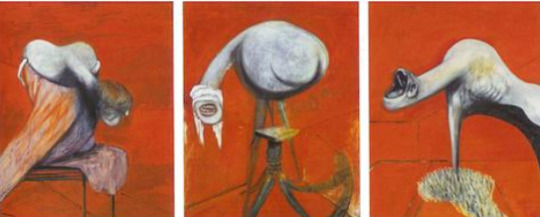
As tenuous as it may seem at first glance, I firmly believe that the writing itself supports my fascination with this piece. It demands to be noticed. It is a vivid splash of red in a box of brutalist grey; and, furthermore, unlike the other paintings in the Dubai penthouse, it's written into the dialogue. The camera lingers there - hence, the series wants us to pay attention; and, while its subject-level significance is not to be discarded, I cannot help but see another, similarly emotional allusion within the same frames.
Instead of drawing from the painting, this story layer connects more to the artist himself. One of the most notable periods of Francis Bacon's personal life was his relationship with George Dyer, which lasted from the 1960s to the early 1970s. Unlike his previous paramours - who were largely older (and, in the case of the last, abusive) men, Dyer was a young addict. Described as someone who could "throw a decisive punch," he was nevertheless vulnerable and trusting; as such, Bacon took on a dominant role, and Dyer became his muse. Among Bacon's portraits, he was ever-present; and though the relationship was tumultuous, often overwhelmed by their shared addictions, those paintings are uncharacteristically tender.
The story ended with tragedy - it's an account of drugs, alcoholism, neediness, dependence, classism, friction, and Dyer's eventual suicide; and within the context of IWTV, this framework is undeniably thematically relevant.

From the beginning - a decade-long involvement, addiction, an uncharacteristic tenderness - beat for beat, the book version of Devil's Minion is the same story, happening only a few years off. The presence of the Bacon painting within the Dubai penthouse is, in my opinion, an indicator to it having happened in the show as well. Just like Dyer, the TV version Daniel met Armand in a pub (or bar); just like Dyer, he is compact, athletic, pale, working-class - and, when under the influence, boisterous and active.
There is, naturally, one key difference; unlike Dyer, Daniel survives.
In the Doylist sense, the painting, therefore, acts as a visual cue - almost as evidence, of sorts. The memory of their entanglement may be effaced, but the blood-red stain of it is impossible to ignore, as is this placement:

I don't believe it is accidental that the painting is sold almost as soon as Daniel arrives in Dubai. It is an indication that the Devil and his Minion are no longer locked within a determined ending; their story continues, and memories are replaced with the real, living thing.
Edit: it bears pointing out that, while I had this post hanging in my drafts, convinced that I was reading far too much into something that already had another reason to exist, it's been announced that the relationship between Daniel and Armand is, in fact, going to be explored within the series. My every wish has been granted, and I can hardly wait.
#iwtv#interview with the vampire#amc iwtv#the vampire armand#daniel molloy#francis bacon#art#art history#devil's minion#armandiel#armandaniel#iwtv season 2#assad zaman#eric bogosian#luke brandon field#don't be afraid just start the tape
398 notes
·
View notes
Note
did u not like totk?
i LOVED totk. i think it was well-written and did its job as a sequel to botw very well. HOWEVER. i do think it suffered slightly from the commercial success of botw. as i mentioned in my last post, nintendo does this. thing. when one of their games gets popular where every game after it has to be Exactly The Same so they can make all the money in the world via comparison marketing. (and this is a problem with the wider game industry in general but also a very observable pattern in loz specifically.) I know it's been a pretty long time since botw came out, but before (and immediately following) its release there was some pushback from longtime fans who worried that the open-world and lack of traditional dungeons meant that the game had strayed too far from the classic formula that makes a game a "zelda game." this is to say, botw was EXPERIMENTAL. and the devs had no idea if what they were doing was going to be successful or not. the open-world of botw wasn't a gimmick, and it wasn't the devs jumping on the open-world bandwagon. it was what CREATED that bandwagon. the open-world was a deliberate choice made specifically for botw because it reinforced the story that botw was designed to tell. the game is about exploring a desolate world, about making connections, and rebuilding both the broken kingdom and the player character's shattered sense of self by traveling and learning and building relationships. a large open-world map with only minor quest guidelines and lots of collectibles and side quests lends itself perfectly to this specific story, which is specifically about exploration and rebirth.
the problem is, botw was. almost TOO good. it was so good that every other game company on the planet started scrambling to build giant open-world maps into their next release, regardless of how much sense that actually made narratively. and because of that, when it came time to release a sequel to botw, the devs had a lot to think about. they had HUGE shoes to fill in terms of fan reception, but they were ALSO being asked to follow up one of the best-performing games of all time, commercially. totk needed to SELL as well as botw. And, likely because nintendo was worried about that potential commercial value, totk needed to keep people comfortable. I don't know for certain, but I definitely get the feeling playing totk that the devs were specifically told not to stray too far from what made botw marketable and successful--that being the open world and the versatility of gameplay. so in order to follow that up, they made... 2 more huge open maps, and new gimmick gameplay which was explicitly super-versatile.
do i think that the extra maps and ultrahand were BAD choices? no. however, i don't think they necessarily ADDED anything to the game as a narrative whole. one of my favorite things about botw was how everything seemed to be designed AROUND the narrative, with gameplay elements slotting neatly into the story thematically. totk just. didn't really have that, imo. there wasn't a huge narrative benefit to the gigantic, completely unpopulated depths and sky maps. ultrahand was cool, but within the context of the story it meant basically nothing. in some ways, i almost think totk could have benefitted from a much more linear approach to its storytelling, a la skyward sword, because there are a lot of story beats that have to be found in chronological order in order to have the right emotional impact, but because of the nonlinear open-world it kind of became a struggle to hit all the important story points in the right order. an easy example of this is the dragon's tears in comparison to the memories--the dragon tears have a very specific set order in which they happen, and finding them out of order can make the story you're seeing in them feel confusing and disjointed. the order in which they should be found is technically displayed on the temple wall, but most players aren't going to pick up on that or follow it--more likely, they're just going to explore the geoglyphs as they come across them organically, and therefore will likely witness the story in a completely disjointed way. compare this to the botw memories, which ALSO technically have a set order--the order in which they're displayed on the sheikah slate. however, because they're largely just small moments in time, and not one continuous story, finding them out of order has a lot less of an impact on how you as the player experience the narrative, and it's not hugely detrimental to your experience of the story if you find them naturally as you explore rather than explicitly seeking them out in order. If TOTK had been allowed to deviate from the botw formula a bit, i think we may have ended up with a more cohesive game in terms of narrative beats like that. as it is, i just think the game is torn slightly between wanting to be its own new game with new gameplay and needing to be botw, if that makes sense.
#again. love the game. have played it several times in its entirety. story is great. i just think the gameplay itself could have been better#yk?#asks#zelda analysis
247 notes
·
View notes
Text
Vedic astro mini post_ look at your moon rashi and nakshatra
Creativity, depth and connection to yourself.
🌙🌕
There's a good reason why moon is considered the most important placement. Even if on the surface another element, sign or nakshatra dominates, nothing will resonate with you quite like your moon placement.
But another placement rivals its personal significance and depth, and that's Ketu.
Oftentimes, Ketu is present in every part of a native and their life, because it's quite literally their "foundation". As a result, when people creatively express themselves(putting their essence in something), Ketu placements show up thematically, and usually as the true, core meaning of whatever they made. But Moon is there too. Consider this: if creativity is a state of flow and play, then it requires a state of comfort and ease to access it, which is the Moon.
Moon can be seen as the "key" to Ketu's world. Moon's sign, house and nakshatra placement can indicate experiences or anything that pushes a person into a mode of comfort and ease. And that can trigger creativity. (Claire nakti has a great video on YT about Ketu and creativity. She also touches on how moon's nakshatra shows up more obviously or in terms of the general "setting" of the story in that or another video)
Inspiration itself is seen through 5th house, Venus and Ketu.
You can definitely use this to analyze your own creative process, or just how you go about life in general, esp regarding flow, ease, enjoyment and playfulness. You can also spot connections between your and your fav astrists'/creative people's charts.
You can obviously connect with people who have your big three nakshatras in their big three, also with their yoni consorts. You also almost certainly will feel a familiarity or a "knowing" with people who have your ketu nakshatra in their big three. You might resonate deeply to the creative works of people who have your moon nakshatra as their ketu. (I definitely go "wow" when I read a Kafka quote or listen to Hans Zimmer, both have Bharani ketu).
Anyways, the connection you have to your moon's sign and nakshatra is literally the first thing you should look at. For me, I keep forgetting I'm an Aries🔥🐏 with a Venus nakshatra💕. Fire_ this is important to me, even if my Sun and Asc are in Earth signs and I have nothing else in the fire element. I do relate to the theme of fire strongly and it touches a way deeper part of me than for example, themes of Earth and abundance, as relevant as they still are. It's about the personal significance and the depth of it_ that is what can't be recreated.
#vedic astrology#astrology#nakshatras#astrology observations#sidereal astrology#astro notes#astrology tumblr#moon#moon's nakshatra#venus#ketu#zodiac signs#vedic astrology observations#beauty astrology
145 notes
·
View notes
Text
I really do think that perhaps the most disappointing thing about Campaign 3 is that the concrete elements of the premise - Ludinus Da'leth has been plotting something and is almost certainly tied to the fall of Molaesmyr in some way; Ruidus is Fucked Up and artificially constructed and even the gods are afraid of it (and are obscuring this knowledge); Aeor's destruction was the response of the gods to an existential threat; even details like how the leylines and planes work in this cosmos and Vax's status and the beacons and the Mighty Nein's expertise in psychic hiveminds providing an entry point for the Avengers Assemble vibes - were all quite well set up in Campaigns 1, 2, and supporting materials (notably Call of the Netherdeep).
And then quite literally any coherent philosophical statement or thematic statement was utterly lost in the combination of Bells Hells being ignorant and indecisive people with little interest in experiences outside their own and Matt being like "real world politics are bad so I scrapped anything in the finale that could have been interesting." Like, you would think the setup would be the hard part, and that was, now that we know the full story, totally fine!
But there's literally no cohesive theme to be had - like, if this is supposed to be about the dangers of hiding information, Bells Hells deliberately obscured the story of Aeor, the Grim Verity dumped a lot of information on them and disappeared from the narrative and also provided a great example of why having that information secured could have stopped this whole mess; Vasselheim served entirely as a base of operations for the Accord and military support and the Judicators were just a single jumpscare moment early on that didn't even matter because the ultimate villain was Ludinus; and the Wildmother scene with Orym indicated that perhaps there are things the divine can see that are beyond mortal comprehension! Like, the lesson kind of is "hiding information is good, actually." Or if this is about what the gods have done with the destruction of Aeor, that again really makes the lack of exploration of Molaesmyr - to this day an environmental disaster in Exandria - pretty egregious, not to mention the choice to save the gods by...using the means by which they destroyed Aeor. We've already covered how the concept of divinity was never set up (and the fact that stereotypes of Ruidusborn were relegated solely to supporting materials isn't great either) - but it kind of didn't have to be a problem if the party didn't have such a hard-on for punishing the gods for not fixing all of their problems from very early on.
Like, there is quite literally no theme to be derived from the narrative that is actually supported by said narrative. Fortunately Campaigns 1 and 2 stand on their own anyway and the setup elements are woven into the worldbuilding in a subtle enough fashion but man what a disappointment; all the pieces were there except for a party that was up for the task, and then because they weren't the environment sort of had to bend around them to perastaltically squeeze them through it, further destroying any opportunity to have a theme.
113 notes
·
View notes
Text


Alright, I guess this is my "yap about the Fall of the Mutants" post? This is my first major milestone completed while I'm running this blog so I'll ramble for a bit. This isn't really an event in the traditional sense, like, none of the X-titles actually cross over in meaningful ways other than a member of one book learning about the goings-on of another book via the news or something. So there isn't a grand narrative to comment on, the connecting thread is thematic, I guess. It's really just a glorified status quo change-up, which all events are in theory, but it doesn't actually really have the crossover element of the event which is kind of the selling point, so??? either way I'll talk about each book one at a time

(Uncanny X-Men #225-227)
May as well start with Uncanny. Shockingly, I don't have a ton to say. I think it was fine, but not amazing. Tbh I feel like Claremont's writing falters a bit whenever he's writing about 'end of the world' type stuff on a cosmological scale. The Phoenix Saga is great, but beyond that when he does these 'end of the universe' things it's all very similar, like a mini-Phoenix Saga repackaged. He's in love with these sweeping concepts of the world being in balance, very New Age, and he gets sort of lost in it. I don't have a great way of articulating it, though, and I'll save some of my deeper thoughts on his writing for a big fat Claremont era post once I finish his run. Some cool visuals anyway, and I'm glad that Storm has her powers back. We'll see where the 'world thinks the X-Men are dead' stuff goes, but I'm guessing it's not going to last very long.

(Power Pack #33)
X-Factor, also fine. Also not a ton to say. It was probably the weakest of the 3 overall, but not for lack of trying. I just find these early Apocalypse stories kind of dry? They aren't really saying much with his character, at least not yet. Not a fan of the 'dumb Beast' stuff either, no idea how long that last. I hope this leads to a power reset with him and getting his blue fur back, I really don't like looking at hairless Silver Age Beast. That being said, thank GOD X-Factor as Mutant Hunters era is over. Jfc what a bad concept. Simonson did her best to salvage it but you can physically feel her grating against the concept with every issue she writes. I feel so bad for her for inheriting Bob Layton's mess.
Oh I almost forgot; I hate Caliban in this?? Like, I really don't buy his turn to Apocalypse at all :( Probably the only part of this event that made me a bit irritated.
Every non-X-book tie-in was related to X-Factor, for some reason, also. It's really the only part of all of this that feels like a big event, but it's downplayed. Power Pack and Daredevil all the clear standouts. Really good. Pictured above, the Power Pack issue does a phenomenal job of selling the scale of it from a kids' perspective. Everything is on this incomprehensible scale and watching this giant rectangle of a spaceship knock into stuff in New York really sells how big of a threat Apocalypse is. And Daredevil is an on-the-street version of that, moreso focused on how New Yorkers react to this battle and think that the end of the world is here. It's a very human story and I really should read Nocenti's Daredevil run sometime, it seems pretty good.
The Fantastic Four tie-in was painfully average and the Captain America one was awful. Avoid them lol, they are very mired in their own continuity. Luckily I was familiar enough with the F4's history that I caught on quick, but they are in a VERY weird era here. No Reed or Sue, the Thing is in his pointy rock-skin era, She-Thing just got made, Doctor Doom has been ousted from Latveria... just madness. As for Cap, it's more comprehensible but it's just not very good. They're in the John Walker era and Steve has been forced out of the role (and is wearing USAgent's future costume), but he and Falcon and... *checks notes* Demolition Man a.k.a. D-Man and Nomad-but-not-the-Steve-Rogers-one,-the-Jack-Munroe-one (alright?) go and stop Famine from destroying a fuckton of crops in Nebraska or something and that's it, that's the whole tie-in. No mention of X-Factor iirc. Really weird book.

(New Mutants Vol. 1 #60)
And now, the New Mutants. Once again the BEST X-Family book. I'm a New Mutants girlie, I will stan them until my dying breath and that is THAT. I have so much to say. The book is great, Sunspot and Warlock are back, and the falling out with Magneto and the death of Doug actually sells the event!! It really feels like only they go through a status quo change worthy of the name 'The Fall of the Mutants'. It's a fairly average adventure for them to start with, and there's a bit too much fixation on a fairly uncompelling villain for my liking, but at the end of #60, a switch flicks. Doug dies in a really brutal, unceremonious way. He's just shot by the villain of the arc and that's it. He's dead.

(New Mutants Vol. 1 #60)

(New Mutants Vol. 1 #61)
I love. LOVE. Watching Illyana go demon mode on these guys. No notes. Please more of this before she's uh, out of commission until like 2007 lol.




(New Mutants Vol. 1 #61)
And then #61 is mourning. Everyone lashing out at each other and Magneto... being Magneto, ultimately pushes everyone away out of fear. I don't think my screenshots can capture it, it's really great stuff. (Also, that panel of Illyana crying about pretending to be a normal kid while sitting next to the body of her dead friend? Art.)


(Uncanny X-Men #227)
I almost forgot about this, but in Uncanny #227 we get a checkup with Kitty and Kurt, who are back! The sigh of relief I let out omg. I didn't even realize how much I missed them or how long it's been. Excalibur soon!!!!
Overall, it was alright! I'd say it's a step up from Mutant Massacre at least, which I thought was a bit all over the place. Events were a new concept back then though, and very clearly an editorial mandate, so I guess that's to be expected. I'd say read it if you're a Claremont era fan or an event completionist, but otherwise, eh. Not terrible, not mindblowing.
Except for New Mutants. That was great. Did I turn my Fall of the Mutants post into a New Mutants shill post? Yes I did and I won't apologize
#x men#xmen#x men comics#fall of the mutants#uncanny xmen#storm#ororo munroe#x factor#beast xmen#caliban#apocalypse#new mutants#rahne sinclair#illyana rasputin#danielle moonstar#sam guthrie#doug ramsey#magneto#kitty pryde#kurt wagner#xgirls journey
69 notes
·
View notes
Note
I'm currently writing a story where, in the beginning, I want to show something almost like a montage of my character doing the same thing day after day, longing for change.
I know in a cinematic format, I'd show that as a montage (as previously stated) where he's actively shown getting more tired and drained.
Do you have any advice on how to put that into a writing format?
Montages shine brightest during periods of character transformation, whether that’s showing a protagonist developing a new skill, learning hard lessons, or growing into a different person entirely. Other uses that aren’t character related might be showing world-changing events in your story’s world, or simply showing that time has passed between scenes. They are, however, particularly effective when establishing the growth of relationships, showing long journeys or transitions, or highlighting parallel events and themes that echo throughout your story.
Essential elements for an effective montage
Thematic consistency
Maintain a clear through-line that connects all scenes
Focus on a single character trait or story element
Use recurring symbols or motifs
Ensure each scene builds upon the previous one
Keep the emotional tone consistent
Choose scenes that reflect your story’s broader themes
Link scenes with transitional phrases or imagery
Structural Components
Have a strong opening scene that establishes the montage’s purpose
Give clear transitions between scenes
Create a natural progression from start to finish
Have varied scene lengths for rhythm and pacing
End on a powerful closing scene that shows clear progression
Sensory details
Include vivid imagery that engages multiple senses
Use specific details that anchor each scene
Create emotional connection through carefully chosen descriptions
Balance showing versus telling
Descriptively show the passage of time alongside changes in character and setting
Techniques for writing montages
Identify the primary purpose of your montage
Choose scenes that show significant change or progress
Include contrasting moments for dramatic effect
Focus on key emotional beats
Eliminate redundant or unnecessary scenes
Use active verbs to maintain momentum
Keep descriptions concise but impactful
Vary sentence structure for rhythm
Incorporate time markers naturally
Use time-based phrases to connect scenes
Create thematic links between sections
Tips for writing the passage of time
Time is a crucial element in writing a montage. From linear progression to flashbacks and foreshadowing, it gives you complete control of how it will unfold.
Here are some tips to write the passage of time:
Use the natural world
Describe the changing seasons
Show plant growth and death
Visualise the ebb and flow of tides
Describe the decomposition of flora and fauna
Describe how landscapes change on long journeys
Use the weather to illustrate time jumps
Illustrate the effect that shifting shadows have on a location
Use heavenly bodies like stars, the rise and set of the sun, and phases of the moon
Describe physical activities
Show family gatherings and how they change over the years
Describe the process of finishing a creative pursuit
Create repetitive activities and routines
Have a character engage in an activity, like gardening, that visually changes the landscape
Have your characters learn a new skill
Write a change in location that requires a journey to get from point A to point B
Use your setting’s seasonal celebrations to illustrate a time shift for individual characters and their world
Use sound
Describe the ticking of clocks
Have your characters’ voice change with their age
Illustrate changing musical styles
Have your characters improve an audible skill like singing, swordplay, or learning a musical instrument
Show a character’s conversational style changing as they grow
Use the sounds of nature, like leaves becoming brittle as they crunch underfoot, or rain turning into storms
Use silence to illustrate it getting late
Describe objects
Have food left out go mouldy
Illustrate buildings and settings being overtaken by nature
Show the lifecycle of a family heirloom
Describe textiles fading and degrading over time
Describe the freshness of paint; is it wet and glistening, or cracked and dry?
Illustrate technological change and advancement
Describe the repairs in a beloved object
Show a common object like a pencil to describe how it changes with use
Common pitfalls to avoid when writing a montage
Don’t make scenes too detailed or long
Don’t include unnecessary dialogue — most montages won’t include any dialogue at all, so if you do include it, make sure it serves a very clear purpose
Don’t lose focus on the main theme that your montage is serving
Avoid choppy or jarring transitions
Don’t include irrelevant scenes. It’s far too easy to over-describe, so with a montage, you need to do a lot of self-editing to keep it from being overlong
Always show progression. Whatever purpose your montage serves, there should be a clear difference from how it begins to how it ends
Don’t over-explain changes. Trust your readers to put things together on their own
Experimental approaches
Not all montages need to be written out as narrative scenes. There are lots of different techniques you can try to write an effective montage. Here are some that can work really well:
Diary or journal entries
Letters or emails
Social media posts
News headlines or articles
The passage of time seen from multiple points of view
Reversing the chronology
Parallel character developments
Some writing exercises
Write a short piece showing a character learning a new skill over time
Write a brief sequence showing seasonal changes
Develop a relationship from start to finish showing its most important moments
Try your hand a writing a montage using unconventional time markers. This is also a good exercise for non-linear storytelling!
The key to a successful montage lies in its ability to efficiently show change while keeping readers engaged. The best montages feel natural and seamless while effectively moving your story forward. All it takes is practice and attention to detail!
#writeblr#writing resources#writing tips#creative writing#writing advice#writers on tumblr#writers#writing#writing community#writers of tumblr#creative writers#ask novlr
74 notes
·
View notes
Text
The Ghoul and Lucy MacLean as Modern Orpheus and Eurydice: A Fallout Meta
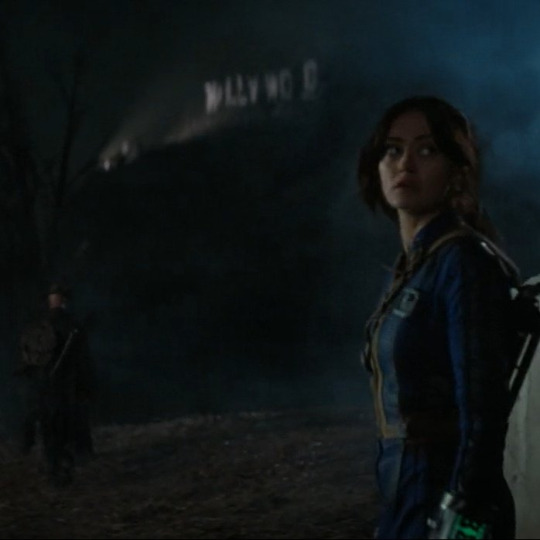

(art by Jean-Baptiste-Camille Corot)
We’ve all heard the Greek myth of Orpheus who ventures to the Underworld to bring his wife Eurydice back to life. It’s one of the greatest tragic love stories that has been retold and passed down to us in different forms of media.
Isn’t it interesting that Fallout begins with The End and ends with The Beginning? It refers to the bombs falling in the first episode, and the past being revealed in the last, but I believe it goes deeper than that. It’s a direct reflection of Lucy’s character journey.
Lucy’s journey begins with the shattering of her perfect world. It's the end of her life as she has known it. The event that triggers her descent (in her case, ascent) is the raiders’ attack. Which significantly happens at her wedding. Lucy is stabbed by her husband who had snuck into her Vault with deception. Similarly, Eurydice is bitten by a snake at her wedding with Orpheus, which kills her and sends her to the Underworld.
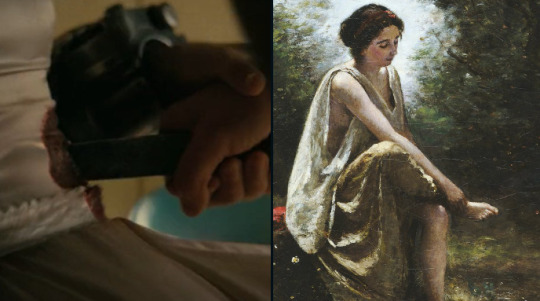
Interestingly enough, if we think of Norm's words as Lucy walks down the aisle, the Ghoul is coded as a possible husband for Lucy. And it's only after she goes to the Underworld/Wasteland that we are introduced to the Ghoul.
In a post-nuclear world, hell would be on the surface and heaven under the ground. The Ghoul emerges from the underground like Lucy as if he's coming after her. (It's funny that three men welcome him as if he's Orpheus at the gates of the Underworld and they're Cerberus.)
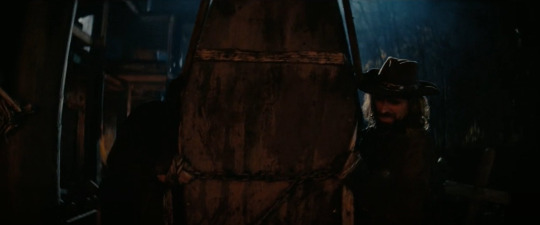
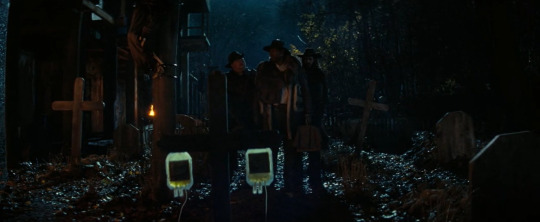
After the tragic wedding, Lucy resides in the Underworld. (An important note here is that while we learn that the Wasteland isn't dead, it is perceived as an Underworld by the Vault dwellers.) Throughout her journey, there is one person who, by happenstance, is always on her trail.

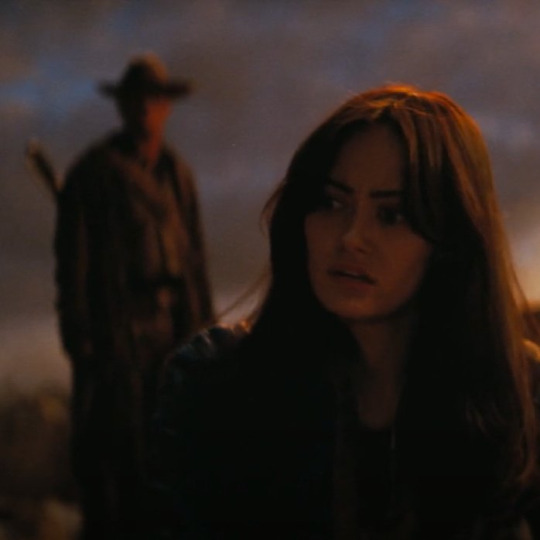
In the final episode titled The End, we find some thematic and visual similarities with The Beginning. Lucy is again betrayed by a person she considers family. Also, the passage of time in both episodes (midday-sunset-night) is clearly marked by the change of colors in the sky.

Two significant scenes for Lucy happen during the sunset. As a symbol, the sunset stands for transition or even death. The world is changed for the night. It's both an end and a new beginning. It's a meeting between the day and the night. In both these scenes, Lucy agrees to share her journey with another person.
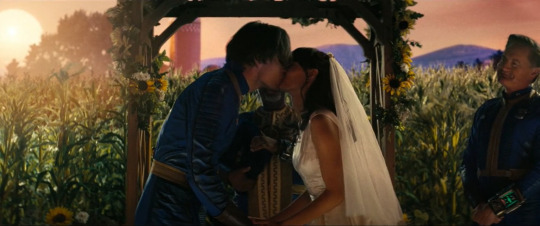
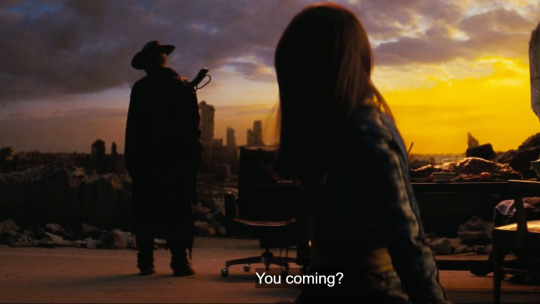
If we rewind back to the Ghoul's entrance in the scene, we see him catching Hank by surprise with his words. In fact, the Ghoul speaks a lot and almost enthralls his enemies with his power of speech/acting. It's reminiscent of Orpheus' gift of music which helps him tame the beasts.
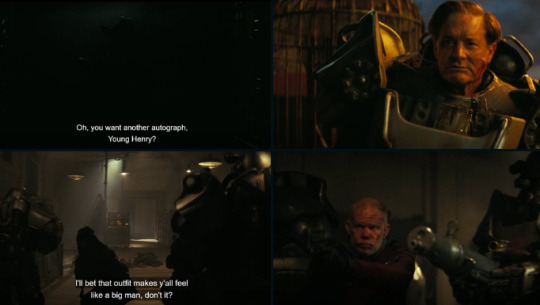
Here begins the deviation from the original story. In the myth, Eurydice has no agency. Orpheus ventures into the Underworld, begs for her soul, and takes her on the journey back. Some modern critics point out she'd already forgotten him and wouldn't want to return back to life.
The Ghoul offers Lucy a clear choice between her staying with the dead (in this moment, they are surrounded by Max's unconscious body and her mother's remains, as well as the soldiers' corpses) and risking that she dies herself. Or going with him to learn more about the world.
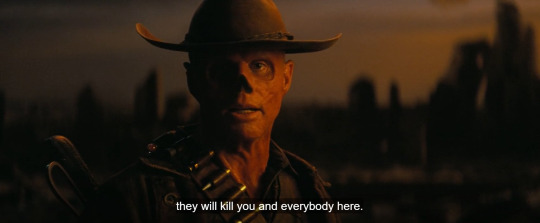
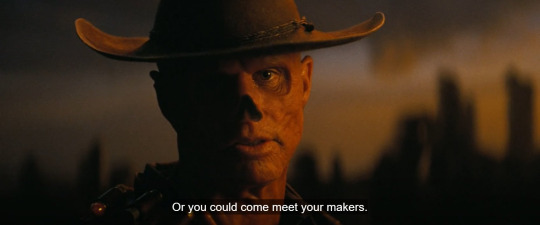
Another important element in the myth, is the backward glance. Hades lets Eurydice leave the Underworld on condition that Orpheus doesn't look back at her until they make it out. As they near the exit, Orpheus turns back and Eurydice vanishes back in the Underworld forever.
In this case, the backward glance isn't a condition. Yet, in this scene, the Ghoul and Lucy's gazes don't meet at all! He has his back turned to her and the one time he turns around, she isn't looking at him. It shows their vulnerability but also their newfound mutual trust.
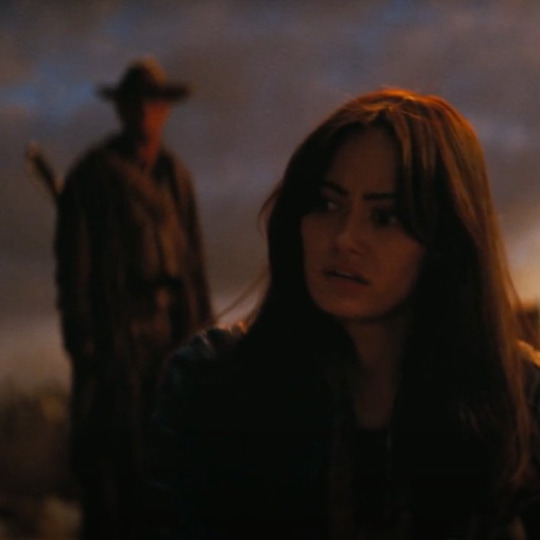
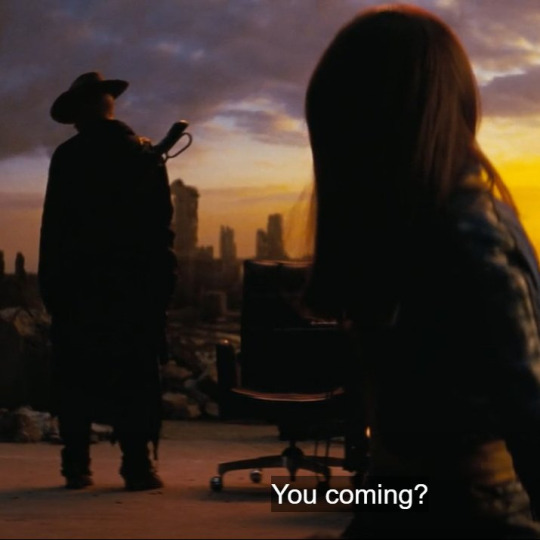
What follows is the scene that inspired this whole meta. The night has fallen. The Ghoul climbs up from a ruined building's dark exit alone. After a moment, Lucy emerges too. They have made it! And the Ghoul still isn't looking back at her. He leads and knows she'll follow him.
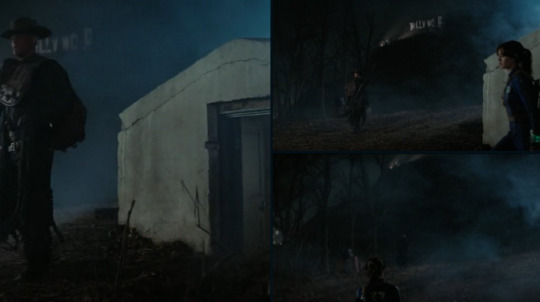
Take a look at this bit from A. S. Kline's translation of Ovid's Metamorphoses, Book X, and look at the following frame:
"They took the upward path, through the still silence, steep and dark, shadowy with dense fog, drawing near to the threshold of the upper world."

A final note about Orpheus and Eurydice's names: Orpheus means "the darkness of the night", while Eurydice means "wide justice". Well, what can I say?
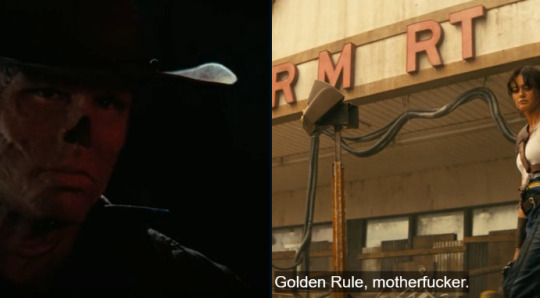
Looking back on my Lucy analysis, it's interesting that the final scene with them both emerging from underground marks the transition between Act 2 and Act 3, or Death (Transformation) and Emergence (Support). This would've been Eurydice's POV journey if Orpheus had succeeded.

#decided to post it here as well for safekeeping#vaultghoul#ghoulcy#cooper howard#lucy maclean#fallout prime#fallout meta
168 notes
·
View notes
Text
See I don't necessarily disagree with what seems to be the primary reading that Yue Qingyuan's shifu fucked him over, caring nothing for his needs or preferences and only for whether he was useful. That makes sense, it ties into plenty of the generational and societal themes of the story. It fits.
But iirc we don't actually get enough information to know that's what happened.
And the thing is it would be so in-character and also thematically appropriate if Yue Qingyuan absolutely did not explain his goals or why he was working so hard, because it was private and shameful and he didn't expect any sympathy, and there was a high risk of losing everything if he blabbed.
And also if he engaged with the existing ruleset with which he was presented, i.e. 'can't go off on your own on personal business until you've mastered your sword,' in the most negative and controlling manner possible, as absolute commandments.
He's a different kind of guy but he comes from the same background as Shen Jiu! It fucked him up also!
He is very very very not a guy who trusts the system to make allowances for him--even once he has all the power he 'does what he wants' and 'makes selfish choices' as a conscious transgression; not something he has a right to do, just something he can get away with so he's gonna. (And ofc he spends almost all the latitude he grants himself on sqq.)
And even less is he a guy who opens up easily.
He isn't too proud to ask for help or pity, so much as he just doesn't expect to get any.
So in this interpretation, he understood that rule as a non-negotiable barrier in his path, the target to overcome, and focused all his considerable will and talent on overcoming it through the sphere of action he felt he had control over.
And fucked himself up bad.
Whereupon his teacher, possessing absolutely no context for this dumb shit their star pupil pulled, did the only thing they thought might work to save his life, paying in the process no attention to the raving of someone deep in a psychotic break.
Like, I feel like there should have been a better, kinder medical option, but I don't know for sure that there was, so I can't say with certainty this was the kind of cruelty that derives from not caring enough.
And it really would be kind of elegant and so typical of Yue Qingyuan's fundamental tragedy if the real mistake was 'not confiding in anybody' the whole time.
And he was just so deeply sunk into the understanding that explaining and asking were useless that, even looking back, it never really occurred to him that maybe his mistake wasn't 'fucking it up when trying too hard to solve everything on his own' but 'assuming there was no help to be had, and that he had to do it all on his own.'
Like. What if this really could all have been avoided if he'd just trusted and communicated with the adult in charge of him? But of course, of course his history of trauma (neglect, child abuse, exploitation, being the One Responsible for the younger kids whom he could not keep safe) meant he was absolutely not going to do that.
It was basically impossible. For the person he was, the person the world had made of him. And that's always been the core tragedy the whole novel circles back upon.
People can only ever be themselves, and so very often the elements of self that let them survive until now are that which dooms them, that means they need someone else to intervene if they're ever going to be saved. Because your personal doom is always the thing from which you can't save yourself.
#hoc est meum#JUST LIKE SHEN JIU#yue qingyuan#svsss#scum villain#meta#trauma#ambiguous backstory elements#tragedy#growing into your deathmask#the fact that shen jiu got in#and got promoted#tends to imply the former generation wasn't particularly inflexible#or unwilling to entertain deviance#the fact that yqy got made Sect Leader#despite his disability#suggests his teacher valued him#on a personal level#though not necessarily a level that gave a shit#about his happiness or wellbeing#but we srsly do not know
326 notes
·
View notes
Text
The Violence of Conformity: on Queerness, Shame, and Vampirism
As we all know, and as I feel I must express again - the metaphorical layers of Nosferatu (2024) consist of several complex, frequently intersecting social themes. Some of them, admittedly, exist a story or two below the surface-level discussions; but that makes them no less influential in regards to the primary plot, and they demand the viewer's exploration just the same.
This is especially true in regards to Eggers' approach to homoeroticism. Its presence within the film itself is unsurprising - implicit, or even explicit, expressions of queerness are a hallmark of gothic (and especially vampire) media. In the case of Nosferatu, this narrative vein provides an undercurrent to almost every aspect of the story; and, because I can't stop thinking about it, I'm making it everyone else's problem.
The Hutters are queer, biting is a metaphor, details under the cut.
To begin with, I must clarify that a queer reading of Nosferatu is not an external introduction. While that lens may be applied to any narrative, given a thorough enough discussion of gender roles, sexuality, and cultural context, it has always been a natural - if sometimes unspoken - component of gothic horror. Elements of it are observable in classics like Frankenstein (Shelley), The Picture of Dorian Gray (Wilde), and even detective fiction offshoots like The Hound of Baskervilles (Doyle), etc; and within the vampire subgenre, it is practically a requirement.
That, like many other things, may be ascribed to Lord Byron and his ever-enduring cultural legacy. In the year 1819, at the Villa Diodati in Switzerland, he challenged his illustrious group of friends to each write a ghost story; and while only two achieved any sort of prominence, that much was sufficient to alter the history of the horror genre. One of these was Mary Shelley's Frankenstein; the other was The Vampyre by Dr. Polidori.* As the title suggests, it was the first Western work of fiction that featured such a monster - and, in doing so, it set the blueprint for countless others to follow. Since then, the genre has been defined by the shape of the dark, hedonistic, and dangerous Lord Ruthven, who was unmistakably modelled after Byron himself.
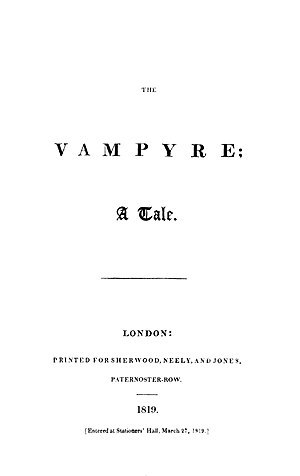
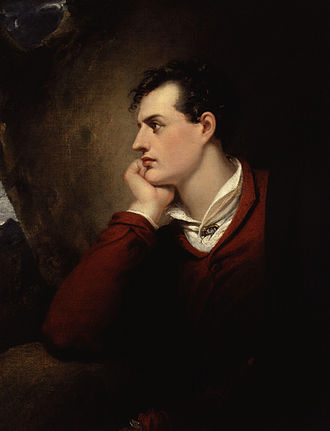
As a character, Ruthven is confident, dominant, manipulative - and brooding, on occasion. His interpersonal approach is defined by a sort of hypnotizing, seductive, possessive, most certainly ill-advised allure. The overall impression is devilish; and that is indeed the point. Within the thematic framework of The Vampyre, Ruthven represents temptation of all kinds. He never hesitates to indulge himself; and so, once he is bored with cards and brothels, he has no qualms about fixating his appetites on Polidori's main character, Aubrey.
Their relationship is notably homoerotic. Despite - or, perhaps, even complemented by - Polidori's amateurish style, the text demonstrates a genuine, striking sensuality between them. In 1819, this easily fell in line with the rest of Lord Ruthven's characterization; and, following The Vampyre's a rapid rise to popularity, vampirism became a shorthand for any "sinful" - or, socially forbidden - sexual expression.
Given the numerous restrictions of the time, most of which persist today to a degree, this includes not merely abusive or incestuous, but also queer, interracial, and extramarital relations - as well as anything involving kink dynamics. From Ruthven, we get Carmilla (LeFanu), Dracula (Stoker + adaptations), and even relatively recent installments like Lestat (Rice).**
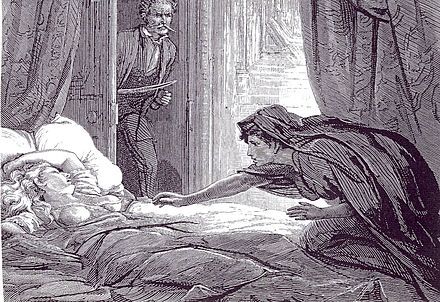
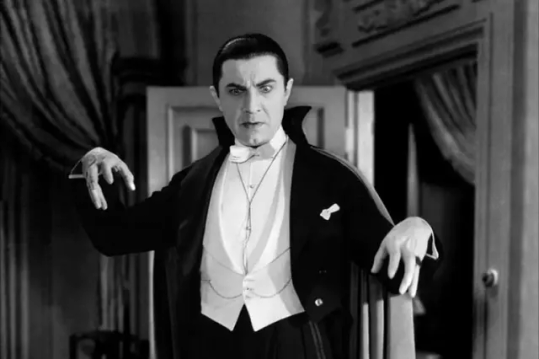
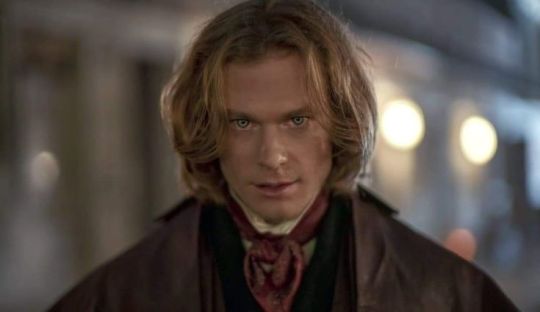
The premise of Nosferatu is no exception. One of the most famous cases of copyright infringement, and a triumphant testament to the historical/preservationist value of media piracy, Murnau's 1922 silent film survives - against explicit orders of the Stoker estate; and, being the literary bastard child of Dracula himself, Orlok maintains many of the same characteristics as his predecessor.
Among these is his implicit and classically vampiric queerness. Like the rest of the film, it is amplified in 2024 - and especially prominent in the first act, in which Thomas Hutter arrives to Orlok's castle.

It is evident from his earlier characterization that Thomas is a repressive type. More so than Aubrey or Jonathan Harker, he keeps his head down, obstinately ignoring the web of fears that shape his daily existence; and it is a monster's narrative duty to expose and realize every single one.
Granted, social circumstances do play a role in this situation. Aubrey has wealth and status; Jonathan Harker has friends and a stable, loving marriage; and Thomas Hutter has neither of those things. Without the benefit of money or community, he lives within a world that is almost as restrictive as Ellen's. His personality is defined by his similarly desperate desire for respect; and his behaviour throughout the film is informed by that underlying pattern. It manifests, most prominently, as a near-compulsive, yet formulaic, adherence to social expectations. He chases after a promotion, marries, gives his wife flowers she didn't want - and, in the same breath, dismisses her "childish fantasies", not out of any malicious intent, but simply because it is supposed to be his duty as a man and husband. It is a destructive cycle of indignity and overcompensation - and I believe it is essential to acknowledge that it's motivated, in great part, by his financial insecurity. As a self-described "pauper," Thomas is anxious to prove himself to his ruthless, unforgiving society - because if he does not, he runs a very real risk of losing even the few comforts he has managed to scrape together.
This threat of destitution is an act of violence. Implicitly, constantly, in consequence of daring to exist, Thomas is being held hostage - unless he conforms.
His sojourn at Orlok's castle is, therefore, peppered with evidence of his superstitions, his social class, and his weakness. Orlok - whom he eventually finds slumbering in the dungeon, the symbolic core of the building itself - is its culmination. What Thomas sees after opening the casket is a nude man, always and never dead, who is trying to take away his wife and imprison him, like a damsel, in a castle. He is horrified; and the implication is blatant. In context with everything else, the deeply sensual, lingering brutality of Orlok's attack is symbolic of the one last thing that Thomas is repressing - and has been for so long that facing it is unthinkable. Still, he can do nothing to resist Orlok - who pushes him to annul his heterosexual marriage, subdues him, bites him; and drinks from him, night after night.

Even during daylight, Thomas fails to destroy his tormentor. In the story sense, he cannot do it because Orlok is a vampire; on the symbolic level, we understand that he cannot kill his own nature.
It goes without saying that this experience is violent; it is both grotesque and shockingly, blatantly lewd. It is traumatic. It is euphoric. It is a form of sexual assault, as far as the biting - a naturally penetrative act - is concerned; and, crucially, it is also Thomas' own repressed desire forcing him to know it. His fear and self-disgust are made flesh in Orlok. Unwanted Desire versus Unwanted Advances; it is a classic gothic paradox - and, in the end, he is unable to accept it. He flees, back to Ellen and the familiar comfort of repression.
Curiously, Ellen herself - who is also distinctly queercoded - presents a depiction of an alternate path.
Like Thomas, she begins the film rigidly repressed and doing her utmost to conform to the established heterosexual social standards. The most prominent factors behind Ellen's oppression are ableism and misogyny - both rooted in things she cannot possibly hide. Her seizures are extremely noticeable to say the least, her neurodivergence affects every conversation she has with the people around her, and all of them perceive her as a woman first and a person never. As the film goes on, it becomes increasingly clear that this emulation of a happy marriage requires constant and agonizing effort to sustain; but while she is also blatantly queercoded, and this queerness definitely contributes to the way she is treated (e.g. by Harding, who views her as a threat to his own marriage), her struggle in maintaining her union with Thomas is not necessarily rooted in a lack of sexual attraction.
The issue is, rather, its "inappropriate" manifestation. Ellen is sexually dominant. Her desires are carnal (and, as the original script implies, mildly sadistic). In a society that expects women to be both innocent and submissive, limits their financial opportunities, and threatens the nonconforming with institutionalization or abandonment, she is caged.
Unlike Thomas, she is aware of that and resents it accordingly - which is not to say that she doesn't feel overwhelming guilt in regards to her sexual inclinations. She absolutely does; and it is interesting to note here that her own pain, in this case, manifests as attacks on her husband and Anna.

This is the part of the story that actively deals with Ellen's queerness. It is evident that she has lived her entire life with the idea that such feelings themselves are sinful; her desires are already unacceptable, even within the sanctity of a heterosexual marriage - thus, actively pursuing another woman would be monstrous. In this interaction, however subtle or unspoken (and, on Anna's part, likely unrecognized), Ellen perceives herself as an aggressor. This is the reason her friend is attacked directly after they share a private, tender moment together - true to the classic gothic vampire tradition, Orlok is, consistently, the direct manifestation of Ellen's shame. He drinks from Anna's breast (the characteristic bite notably favoured by Carmilla - the original lesbian vampire); he destroys the Hardings' perfect nuclear family; and Friedrich Harding blames Ellen and her "fairy ways." Symbolically, their suffering is her punishment - both for feeling a brief moment of queer affection (guilt, fear - direct, setting-driven), and for refusing to indulge it (self-acceptance, rebellion - metaphorical, represented by Orlok).
Still, despite her fear and guilt, Ellen knows that she has done nothing wrong by following her "nature." Her queerness is inherent to her - much like her disability, or her psychic gift; and it is no accident that, among the human characters, the latter is only truly identified by the remarkably eccentric, disgraced, flamboyant, cat-loving, unmarried, bohemian Von Franz. Even though he might be better-adjusted to their surrounding society than her, he still decidedly exists on its outskirts. There is a familiarity of recognition between them, as well as the particular dynamic of a fresh and uncertain fear vs a resigned bitterness that alludes to an interaction between two different queer generations. Even as he is unable to promise her a happy ending, he confirms that she was meant for greater things than the world around them would allow; and that, in my opinion, marks a turning point.
Prior to her conversation with Von Franz, the only validation Ellen has ever received was from Orlok - which posed a moral complication. He was and is a monster, and as such, she believed him to be, fundamentally, a "deceiver." Because of this, she could not bring herself to entirely accept what he was saying; but, conveniently, Von Franz provides an alternate opinion. He stresses that her gift is not only powerful, natural, and inevitable, but also inherently beautiful and sacred.
This is a drastic shift from the way Ellen is normally perceived by humanity. The story consistently demonstrates that the other characters dismiss, infantilize, or condemn her out of turn; however, in this new philosophical context, her night of passion with Orlok - or, the city's only hope for salvation - becomes a supremely important, adult, and holy act. In a spiritual sense, it is equivalent to a marriage; and the film frames it as such.

Like a father, Von Franz gives her away. Despite his well-established monstrosity, Orlok is tender with her to the point of reverence; and she pulls him close - as unnecessary or selfish as that may be. It is, after all, a metaphor. By embracing the Vampire, Ellen embraces the physical representation of everything she had once considered ugly in herself. In regards to her queerness (as well as her psychic power/neurodivergence/disability/personhood), it is a triumphant moment of self-acceptance.
Ellen's arc therefore ends in sublimation. Meanwhile, Thomas is left behind; over the course of the film, he has been unable to let go of the structures that have directed his thinking and behaviour throughout his life - and yet, at the same time, he has also seen them fail, over and over. Knock betrays him, Sievers is out of his depth; Thomas himself cannot be a hero, and Harding - his glittering ideal - crumbles, consumed by grief and madness. The finale, therefore, leaves him on a precipice.


It is a classic moment of deliberation - epitomized, perhaps, by The Matrix (Wachowski Sisters, 1999), in its iconic "red pill/blue pill" scene. As much as the interpretation of it has been twisted over the years, the fundamental, intentional meaning of it is inherently queer; it is about weighing the danger and value of awareness against the meaningless bliss of ignorance. These narrative points are most frequently framed as a beginning - but for Thomas, that is how the movie ends.
He could return to the prison of his daily existence, repress everything he truly feels once more, and suffocate himself in a stranger's life. Before him, Ellen and Orlok depart into a "sea of fog" - an unknown, terrifying, beautiful alternative. It is a promise of freedom and a guarantee of struggle. He sees an example of what he could become, in them and in Von Franz. Their society - and ours, to a degree - is unforgiving of deviation, yes, but the story has also forced him to recognize that acquiescence is not the only option; nor is it actually enough to protect him or his loved ones. Within an oppressive society, safety is always subject to an implicit transaction; and as the finale of Nosferatu makes painfully clear - Orlok may have been in covenant with the Devil, but Harding is the one who sold his soul. The question, now, is whether or not Thomas can bring himself to ignore that.
I know what I would personally wish for him - a full and vibrant life, somewhere on the edges of polite society, that allows him to delve into the eccentricities he never knew he had. He could get into the occult himself; maybe even meet a dashing vampire hunter who would sweep him off his feet and shock his lingering sensibilities every morning (and if the man's a cowboy, even better). However, the point is that we do not know what he will do or what will happen. A life is always in flux. Regardless of our circumstances, there are still a few things we get to choose for ourselves, and a precipice is also sometimes an opportunity for a leap of faith.
I hope, most affectionately, that Thomas Hutter jumps off a cliff.
*POLIDORI - Dr. John William Polidori, who may indeed be considered the creator of the modern vampire genre, graduated from Ampleforth College in 1815 with a thesis on sleepwalking. It's not exactly relevant; but, in the context of Nosferatu, rather apt. I would've really liked to see his thoughts on it, seeing as it's such a perfect intersection.
**LESTAT - being blond, Lestat does stand out from the primary archetype in the visual sense; but the current discussion is more in the realm of personality.
#`nosferatu#nosferatu 2024#nosferatu (2024)#thomas hutter#ellen hutter#count orlok#friedrich harding#anna harding#von franz#willem dafoe#lily rose depp#nicholas hoult#bill skarsgård#vampires#vampirism#dracula#carmilla#gothic horror#horror film#horror film analysis#nosferatu meta#queercoding#literature#film#queer fiction#queer lens#vampire#gothic romance#emma corrin#aaron taylor johnson
129 notes
·
View notes
Text
Stranger Things (2x01): “MADMAX” Review
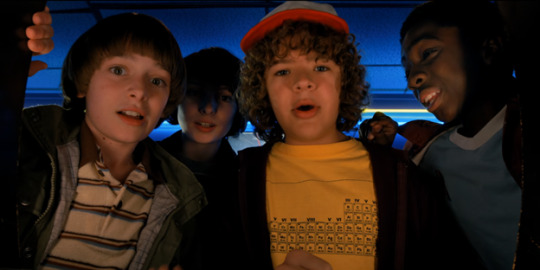
If you haven't yet, be sure to check out my previous reviews:
Stranger Things Episode Reviews:
Season 1:
The Vanishing of Will Byers
The Weirdo on Maple Street
Holly Jolly
The Body
The Flea and the Acrobat
The Monster
The Bathtub
The Upside Down
Stranger Things Play:
Stranger Things The First Shadow
Out of all the season premieres so far, this one is my favorite. I even like it better than “The Vanishing of Will Byers” (which was a great episode on its own) for one particular reason: This was a Breather Episode. One where the characters (and by extension, the audience) got some kind of break from the chaos and intensity that the show usually propels everyone into.
Sure, there are ominous signs that something horrific is on the horizon (Will’s vision of the Upside Down for instance), and the episode has clever foreshadowing for what’s to come. For the most part though, there is a sense of calm before the storm that I appreciate. We get to see the characters we love trying to live their lives (even if they can’t return to the way things were), we see the introduction of new characters, friendships and relationships continue to develop (with some nice character interactions, both old and new), and the episode takes its time setting up the story beats and themes regarding this season. It also helps that the Duffer Brothers find the right balance in this episode between being humorous without going over-the-top (like “Suzie, Do You Copy?” did) and dark without being mean-spirited (like “The Hellfire Club”).
In other words, this premiere got me excited for season 2, and the rest of the season did not disappoint.
Part 1: Frozen in Time
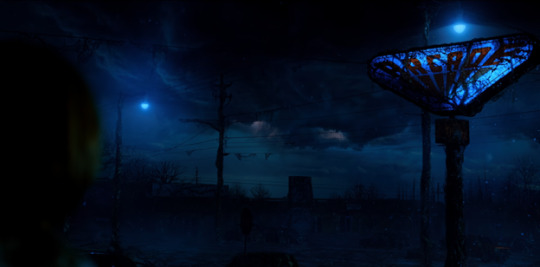
With the revelation in season 4 that the Upside Down froze in time on November 6th, 1983, it adds a new layer of thematic importance to the show and what the characters are going through this season. I’ve already talked about theories regarding the Upside Down in my season 1 reviews, but one key detail I’ve hoped to convey is the way the Upside Down froze: It's almost like a photograph capturing everything in that moment: The exact time it was taken. The place. The things and objects that were in the vicinity of the photograph. It’s a moment frozen forever in one picture. The big difference is how distorted everything looks, and the lack of context behind it.
I’ve said this before, but for as much as Stranger Things acts a love letter to the 80s, it also serves as a deconstruction of the decade, especially with the problems people faced back then and how certain social issues from that decade have carried over to today’s culture. There were fun things about the 80s, but it also had its uglier aspects. In a way, you could argue the Upside Down's nightmarish version of Hawkins and the rest of the world is a metaphor for how warped the nostalgic perspective can be. There are people who look back at the 80s with rose-colored glasses while ignoring the elements they find unpleasant or twisted, and the opposite where people only see the darkness while ignoring the positives from that decade. That’s also including those who were alive during that time, and what they may have been going through that shaped their perspective of that time period.
In the case of certain characters in this episode, it’s pretty clear that while some have been able to push through what happened the previous year, others have “frozen” in a way that eerily parallels what’s happened with the Upside Down. They are stuck emotionally due to trauma and PTSD, unable to let go of what happened the previous year, and even reliving certain scenarios in their heads. In Will’s case, it’s more literal due to his connection to the Mind Flayer. He wants to move on, but the Upside Down won’t let him. And contrary to what Dr. Owens tells Joyce and Hopper, we’re about to find out Will’s problems go beyond PTSD.
Will’s situation is sad because he’s desperately trying to move on and wants to return to the normalcy he had prior to the Demogorgon taking him. However, the reality is he can’t go back, and the concerns of others around him (even if they mean well) are adding onto his frustrations over his current situation. Joyce has become hyper-protective of Will, to the point she won’t let him ride his bike anymore at night and wants to know where he is at all times. Jonathan’s become a lot more concerned about how Will’s handling things (given the nasty “Zombie Boy” note Will found in his locker, as well as how Zombie Boys and Flight of Icarus depict Will getting bullied following his disappearance the year before, this is somewhat understandable) to the point Will finds it infantilizing. Even the scene of the principal escorting Will to Joyce’s car while everyone watches is a painful reminder to Will of the circumstances he’s in, how everyone is aware that something abnormal is going on with Will, and how he can’t escape it no matter how much he wants to.
I find it telling that when Will gets annoyed with Jonathan and lists off the people who keep treating him like there’s something wrong with him, Will doesn’t mention Mike’s name. It’s a small detail, but looking at how Mike behaves towards Will in this episode, it makes sense: While everyone else is openly acting like Will’s going to collapse in front of them at any given moment, Mike is careful not to do that. He recognizes Will doesn’t want to talk about his situation (at least not yet), and that Will doesn’t need the constant badgering over his mental state. Instead, Mike treats Will like it’s any other night of friends hanging out. It doesn’t mean Mike is unaware that something’s going on with Will (as we see when Mike finds Will outside following his vision) or that he doesn’t have his concerns, but he’s savvy enough to recognize that bringing this up will just make Will feel worse, and instead works to be there for him without prodding. It reminds me a little of the 50/50 movie where Joseph Gordon-Levitt’s character gets diagnosed with cancer and his friend (played by Seth Rogen) tries to help him through it the best way he knows how: Being there for him and treating him normally without becoming overbearing. He does take his cues from self-help books, but he is genuine in caring for his friend without forcing him to confront his mortality, similar to how Mike doesn’t want to force Will to relieve his trauma. Will likely noticed, and appreciated this.
Speaking of Mike, we also see him go through his own issues in this episode. Just like how the Upside Down froze, Mike has refused to take down the home he created for El in the basement, with it being frozen in place as if El was still there somehow:
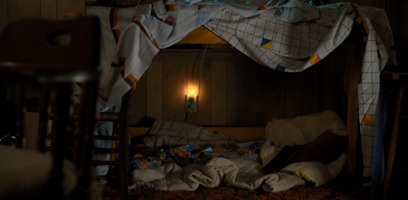
Given the next episode reveals Mike briefly saw El through the window of his house following the attack at the middle school, it’s understandable why he’d hold on to the hope that El may have survived and is still out there (even in spite of seeing her and the Demogorgon vanish) and is counting down the days since her disappearance. Confronting the alternative, with El dead and him having lost someone he loved and cared about, would be overwhelming. However, it also puts him in the position of not being able to do anything for El, which makes him feel frustrated and causes him to start acting out.
I know Mike’s behavior in season 2 gets flak from fans, and he’s even been referred to as “Emo Mike” by the showrunners, but for all the problems he displays this season, there’s a bitter implication that Mike suffers from depression. It doesn't help that the show conveys the impression that whatever issues he’s dealing with are either belittled or ignored by those around him. It’s mentioned in the aftershow Beyond Stranger Things that a big reason Mike is “frozen” is because he doesn’t have anyone to fall back on, and he’s unable to impress anyone the same way he was with El. While I think that’s true to some extent, I also think El in many ways acted as a safety net for Mike, and visa versa. She was responsible for helping Mike to come out of his shell during the week they had together. He may have been the Dungeon Master in his basement where he could control the world he created, but when it came to the world outside of that, he had very little influence over his circumstances and initially reacted passively to the bullying inflicted on him, as well as how he dealt with school and the direction his life was going. Then he meets this girl who brings out an inner strength inside of him, to the point he’s doing things he’d never expect to do, like standing up to Troy and James at the assembly, or shielding El from the Government at the risk of being caught and killed, or willingly walking off a cliff to save Dustin, or even facing down the Demogorgon with his friends. Then tragedy strikes and El disappears from his life, and it suddenly feels like none of that mattered. Yes, Will did come back from the Upside Down and Mike is glad that he's safe, but that doesn’t erase what he lost with El. Now, everyone around Mike is expecting him to move on without telling him how he needs to, like they expect him to go back to the way things were before.
Is it any wonder he’s not impressed with his parents essentially telling him to get over it (even if they don't use those exact words) during dinner?

Usually when people are acting out, it’s their way of letting others know they’re not okay, and it’s also a way of them letting their emotions out while trying to get some kind of control in their lives. Mike is in a position where he’s unable to help El, and he knows it. He considers everything else at this point (aside from his friendships, which he still values) to be secondary compared to knowing whether El is alive and being able to do something about it. Some people might argue that the things Mike does during this phase are unsympathetic, even if the context behind his actions are understandable, but I get where he’s coming from, even if it doesn’t excuse everything he’s doing.
Speaking as someone who’s suffered depression for years, I can confirm that you don’t just “get over it.” There are things you can do to help mitigate the symptoms (which I would argue Mike tries to do in this episode in hanging out with his friends at the arcade), but there isn’t a specific period of time where it just disappears and you never experience it again. Karen and Ted have a right to discipline Mike for how he’s acting, but they are mistaken in believing this is just typical teenage angst that should have run out the clock by now. Sadly, this is the 80s where depression had an ugly stigma attached to it, so Mike is forced to suck it up for the time being.
I will say this: Compared to someone like Billy, whose behavior has crossed a line to the point of him actively and physically hurting people with his rage, Mike’s behavior comes off as laughably tame. If the worst Mike’s done has been cussing out a teacher, or graffitiing on a bathroom stall that everyone draws on anyways, or taking Nancy’s money in front of her with a promise to repay her later, I’d say that’s progress.
Speaking of Nancy, we also get to see how she’s been frozen. She’s tried going back to the way things were, but Barbara’s death still hangs over her and Steve like a black cloud. Natalia Dyer mentioned in Beyond Stranger Things that Nancy and Steve had been visiting Barbara’s parents for the past year in the hopes of giving them some comfort over Barbara’s disappearance (since they can’t directly reveal the truth to them), and the revelation they’re selling the house to hire Murray to look for Barbara is the catalyst for Nancy realizing she can’t keep going on pretending everything’s okay.
I talked about this in my previous review, but a big reason for why Nancy likely went back to Steve (aside from Jonathan choosing to focus on his family at the time) had to do with Steve being the only other person she could talk to about Barbara’s fate, as well as her wanting to give their relationship another chance. In many ways, Nancy took the opposite approach of Mike when it came to her trauma: Instead of acting out, she tried to suppress her emotions. Unfortunately, it didn’t work because she couldn't ignore the trauma and loss that was there, and regardless of whether or not she meant to, it had a negative impact on her relationship with Steve. The tie-in novel Rebel Robin (which takes place between 1983-1984) alludes to this several times:
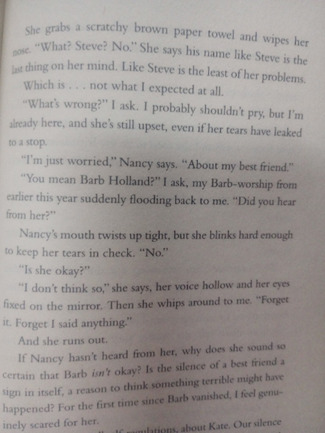
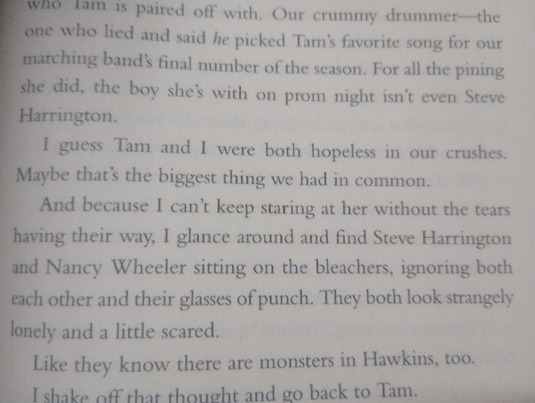
I’m sure there’s been a debate in the fandom about whether Nancy still had feelings for Steve during the year they were together, and I believe the answer is yes and no. I think Nancy wanted to recapture what she felt for Steve prior to Barbara’s disappearance, and I also think she hoped that by rekindling their relationship, it would cause that spark to come back. Sadly, the reality is things had changed drastically during that week in season 1, both with Barbara’s disappearance, her relationship with Jonathan, and how Steve acted during that time, all of which colored her perspective going forward: She’s in mourning for Barbara and hasn’t found closure for it, she can’t ignore the fact that the same time she chose to have sex with Steve is when the Demogorgon took Barbara, nor can she ignore how Steve reacted when he thought she had cheated on him with Jonathan (even if Steve was remorseful about how he acted), and she’s realizing her feelings for Jonathan haven’t gone away. The result is she has lost interest in her relationship with Steve, even while she’s still trying to act like she’s invested.
To a certain degree, Steve is aware of how last year impacted Nancy (even as he’s dealing with his own problems getting into college) and I honestly think he did the best he could in trying to comfort Nancy over Barbara's death, but didn’t know how to do that in an effective way for her. His motivation to continue doing “normal” activities, like going to the theater, prom, Tina’s Halloween Party, or even focusing on sports was likely his way of coping, as if repeatedly doing those activities would somehow desensitize him and Nancy to the horrors of what they previously experienced. Unfortunately, that was never an approach that was going to work for Nancy, and I would argue it didn’t truly work for Steve either.
I’ll talk more about the conflict over how Nancy and Steve choose to deal with the truth about Barbara’s death in the next review, but I get where Steve was coming from as much as I get where Nancy was coming from. He may not have the intense grief Nancy does over Barbara’s death, since neither he nor Barbara were that close, but there is guilt on his part for his indirect role in her death. There’s also the fact that Steve's in this nightmare scenario as much as the other main characters are, and (as of right now) the only person he has a close enough relationship with that he can talk to about all this is Nancy.
Finally, there’s the Steve/Nancy/Jonathan love triangle I want to discuss quickly. The episode makes it pretty clear that Nancy still has feelings for Jonathan, and her invitation to Tina’s Halloween Party went beyond just simple friendship. However, just because that was obvious to the audience doesn’t mean it was obvious to Steve. While he knew that Nancy and Jonathan talked with one another (especially since Jonathan is the only other teenager in their age group who knows about the Upside Down), my impression was that Steve assumed that Nancy and Jonathan were just friends at this point, and that it didn’t go past that. He already made the mistake of jumping to the conclusion Nancy cheated on him with Jonathan, and he wasn’t ever going to do that again because of how disgusted he was with himself for the damage and hurt he caused them. I’ve seen a few fans cynically take the scene of Steve playfully hugging Nancy and spinning her around following her conversation with Jonathan out-of-context to paint it as this calculated ploy to reaffirm to Jonathan that Nancy was his, which I not only find to be a bad-faith misconstruction (and I remember when some dipshit on TV Tropes put Will in the “Unintentionally Unsympathetic” category and accused him of allowing Angela to bully El in season 4 because he was jealous of her relationship with Mike 🙄), but also one that doesn’t correlate with Steve’s character. If Steve honestly believed Nancy had feelings for Jonathan at this point, he either would have confronted her about it already (like he does two episodes from now) or he would have ended their relationship. Steve is many things, but he isn’t manipulative, and he isn’t going to play mind games trying to keep someone in a relationship they don’t want to be in. I think Steve assumed Nancy was still working through her grief regarding Barbara’s death, and it wasn’t until their confrontation at the Halloween Party that it finally hit him that she was in love with Jonathan. We’ll discuss the ramifications of that in the next few reviews, but I’m not remotely interested in demonizing one character to absolve another character for how they handled things (like some fans constantly do).
Part 2: New Faces
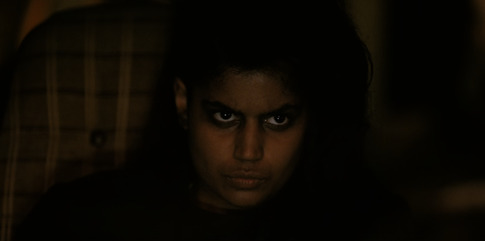
I remember I was stoked for Kali’s character when I saw this episode for the first time. I’ve said before that, aside from the characters, I find the mythology behind Hawkins Lab and the Upside Down to be the most interesting aspect of the show. Because of this, I was invested in the idea of meeting more special kids from the Lab. Comics like Six and Into The Fire implied there were more of them out there who had escaped and were on the run. As of season 4, we know that isn’t true, and those particular comics are officially non-canon. El, Kali, and Vecna are the last of the special kids from Hawkins Lab.
I talked about this in my review of Into the Fire, but I've made my peace with the direction they went on the show. Vecna’s backstory, as well as the Massacre at Hawkins Lab, remains one of the strongest elements to the show’s mythology, and it helps that there were hints all the way back in season 1 that (aside from El) there were no more kids residing at the Lab.
I will give a more in-depth analysis about Kali and her role on the show when I review “The Lost Sister,” but I want to discuss a reference to Kali and her gang that hasn't been cited as inspiration for how their characters were crafted, yet still sticks out for how it parallels their story: Blade Runner.
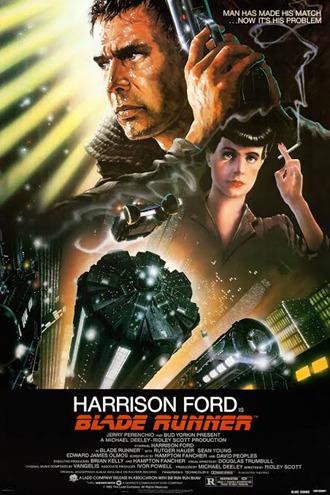
Blade Runner is a 1982 science-fiction dystopian movie by Ridley Scott (same director as Alien). Set in an alternate timeline in 2019 where the Tyrell Corporation has created bioengineered humanoid beings called Replicants to serve as slave labor on the colonies established off-world, the movie centers on Rick Deckard (played by Harrison Ford) who is a former Blade Runner (i.e. a special type of police officer that tracks down rogue Replicants and proceeds to terminate them) that is tasked with eliminating four Replicants led by Roy Batty (played by Rutger Hauer) who are illegally on Earth. The movie deals with Deckard’s investigation while he comes to terms with his complicated feelings regarding a new prototype Replicant named Rachael.
Similar to Kali’s arc this season, Blade Runner has a lot of moral ambiguity regarding the characters and their actions. Everyone in the movie (except for maybe Rachael) comes out as an anti-hero at best and a villain at worst. Deckard may be the protagonist, but he certainly isn’t heroic, and some of his actions during the course of the film cause the audience to question if he’s really any better than the Replicants he’s hunting. The rogue Replicants themselves are no saints, and are not above killing people, but at the same time, their motivations are rooted in survival and attempting to escape the oppressive system that's keeping them down. We later find out that Roy’s end goal is to reach Eldon Tyrell (founder and CEO of the Tyrell Corporation) in order to get a life extension due to having a genetic premature aging disorder. The movie deals with hardcore ethical questions regarding the existence of Replicants, from the dehumanizing way they’re treated, to being genetically engineered in a way where their lifespan is cut short to prevent them from developing emotionally, to the lack of rights Replicants have despite their similarities to humans. There’s also how new Replicants like Raechal are implanted with memories from another person (in her case, from Tyrell’s niece) as a means of giving them an “emotional cushion” that would better allow them to be controlled. Tyrell Corporations motto may be “More Human Than Human,” but that doesn’t mean they treat them as such.
While Blade Runner hasn’t been cited as an inspiration for Kali’s character, I am struck by the parallels between her and the Replicants. Like El, Kali was kidnapped and became a slave for Dr. Brenner and the U.S. Government in everything but name. She had no rights or freedom, she was groomed into becoming a weapon, was abused and punished if she attempted to resist this (as we see in the flashback with Kali and the orderly Ray Carroll), and spent most of her life being treated in a dehumanizing manner. By the time she managed to escape, she is angry and hurt and out for revenge against the people who took away her life, similar to how Roy from Blade Runner takes his revenge against Eldon Tyrell. Even Roy hunting down and physically hurting Deckard in the climax of the movie has similarities to what Kali does several episodes from now when she turns the tables against Ray Carroll for all the abuse he inflicted on her: Both Carroll and Deckard get a taste of what it’s like to be hunted and living in fear. One difference between Roy and Kali is that while Roy succumbs to the end of his lifespan and dies, Kali is (as of now) still alive and out there. Where her character goes from here remains to be seen.
Another character we get introduced to is Dr. Owens, played by Paul Reiser:

The Duffer Brothers have cited both Aliens and Diner (1982) as inspirations for casting Paul Reiser as Dr. Owens. I will talk more about Diner (1982) when I review “The Gate” since there’s a scene from that film they pay homage to in that episode, but the Aliens shout-out is pretty obvious for anyone who’s seen it. In Aliens, Paul Reiser plays Carter Burke, an executive employed by the corrupt corporation Weyland-Yutani. Initially appearing as a friend to Ripley and coming with her and the Colonial Marines to investigate the disappearance of a colony on LV-426 (the same world from the first movie where the crew of the Nostromo encountered the Xenomorphs for the first time), it’s later revealed that not only is he a slimy backstabbing traitor who was responsible for the colony’s predicament at the hands of the Xenomorphs, but he had also intended to get Ripley and Newt pregnant with facehuggers, smuggle them off world via cryochambers, kill the remaining marines on board, and get them delivered to Weyland-Yutani to make a profit from the potential bioweapon the company planned to create with the Xenomorphs. To say he was the most hated character in the movie is an understatement: Paul Reiser’s family were thrilled when Burke was killed off.
By comparison, Dr. Owens had that same vibe when he was first introduced: Someone who appears friendly on the surface, but for all we knew may have had ulterior motives. Paul Reiser’s casting was meant to invoke this, but there’s also the circumstances regarding Owens character: He’s now in charge of Hawkins Lab, and while he tries to reassure Joyce and Hopper that the previous people in charge are gone (notice he doesn’t say Brenner is dead, just that he’s gone), there isn’t a lot of trust established between both parties for valid reasons. He’s trying to be open with Joyce and Hopper, but he’s also dealing with containing the threat of the Upside Down, and there are certain secrets he’s keeping. I seriously doubt, for instance, that Joyce or Hopper are aware that Brenner is still alive, or that Owens ever told them he was. I’m not saying Dr. Owens friendly demeanor wasn’t genuine, and it’s clear he does care about Will’s well-being and is NOTHING like Carter Burke from Aliens, but he is also answering to his superiors who are motivated to keep the main characters in the dark about certain information that they consider classified. This is going to become an issue in season 4 when Owens makes the morally questionable decision to partner with Brenner at The Nina Project while blindsiding El in the process.
Next up we have Murray. Where do I begin?
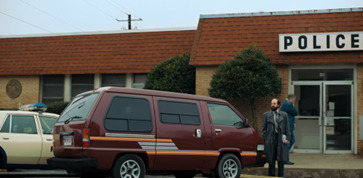
I talked about this in my review of Tales from Hawkins, but out of all the characters in the main cast, he’s probably my least favorite. I don’t hate him, but he never grew on me the same way Steve and Erica did. Part of it is because I’m not a big fan of the type of character he represents (i.e. paranoid, antisocial, no social cues, rudely barging into other people’s business, etc). It doesn’t help that he was likely what Terry Ives was originally conceived to be in the Montauk Pitch:

I’ve been clear for a while now that I don’t like conspiracy theorists, and have little patience for their bullshit. A lot of that has to do with the current political and social climate, as well as seeing the plethora of stupidity, self-absorbed narcissism, and victim-complexes associated with people who behave like that. To the show’s credit, they don’t completely go this direction with Murray. He is established as a former journalist for the Chicago Sun-Times, which gives him some credibility, but that’s also coming with some major asterisks. Murray doesn’t have a life outside of investigating cover-ups, and while comics like Tales from Hawkins (and the show to a certain extent) establish that he is capable of putting in the hard work of following leads, doing interviews, establishing timelines, and so on, that doesn’t mean he’s accurate about everything, or that his theories aren’t wildly off-base.
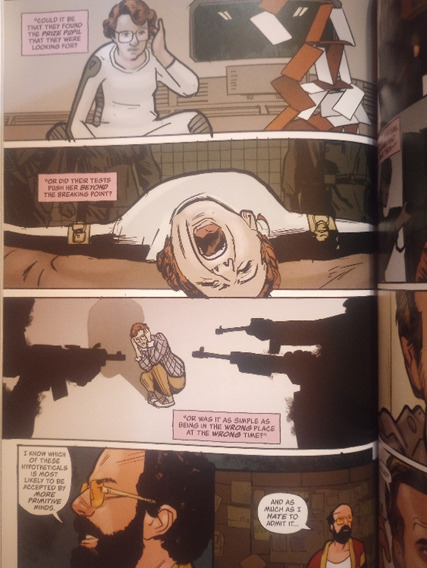
On rewatch, Murray’s claims to Hopper in this episode about a Russian invasion in Hawkins has me raising an eyebrow considering the direction season 3 went. If he was that paranoid (to the point we find out later he’s capable of speaking Russian because he anticipated that skill would come in handy some day) and that convinced about Russians in Hawkins, how come he never noticed anything off in the town regarding certain people who were likely Russian agents? Or even the whole construction of Starcourt Mall for that matter (which would’ve taken months to develop)? Keep in mind that at this point, the Russians already knew about the Upside Down (the first time they tried to open a gate was on June 28th, 1984) and were planning to come to Hawkins to extract monsters from that dimension, so I’d imagine that they were already in the town, either scouting the area, or working on Starcourt Mall, or buying up property and land to build transformers for their key to unlocking a Gate (since I seriously doubt they could access the Gate at Hawkins Lab due to security), or working on any of their other operations. I guess it’s possible to argue the Russians didn’t come to Hawkins until AFTER El closed the gate at the end of this season, but considering that Murray is always looking for another cover-up to expose, I’m hard pressed to believe he didn’t notice anything suspicious in Hawkins between November 1984 and July 1985.
Brett Gelman (who plays Murray) admitted in Beyond Stranger Things that he had this backstory established where Murray’s drive to uncover the truth and “expose everything that is bullshit” (his words, not mine) was rooted in the idea that Murray’s attempts to uncover a conspiracy in the past backfired on him and cost him his family (it’s never stated what happened to his family, but it’s more likely that his wife and kids left him after they got humiliated in the process, as opposed to being killed). The result is he’s been trying to undo that mistake ever since, and his motivation in finding out what happened to Barbara is about making things right by giving closure to her parents and to himself. There is a selfish motivation relating to Murray’s pride, but I’ve never gotten the impression that he was disingenuous about getting the facts right (even if his initial theories were all over the place) and there is the sense he genuinely cares about the truth and not his version of the truth.
There are three movies that have been cited as inspiration for Murray’s character: All the President's Men (which deals with the real-life investigation into the Watergate Scandal), Marathon Man, and The Parallax View. The former movie serves as a story influence for Murray, Nancy, and Jonathan’s attempts to expose Hawkins Lab this season, and I will talk about more about that movie in later reviews, but the latter two films are best saved for future discussions since their plots and themes have more in common with the story arcs in later seasons.
Next up is the introduction of Max.

The title of the episode gives away that her character was inspired by the titular character from the Mad Max Saga. Most people know the general plot of those movies: In a dystopian post-apocalyptic Australia, a former idealistic cop named Max Rockatansky has become a vigilante “Road Warrior” in the resulting wasteland, looking to survive while occasionally helping groups of people at the mercy of vicious warlords and deranged degenerates. Due to the loss of his wife and son to a vicious biker gang in the first movie, as well as seeing the world fall apart before his eyes, he has become closed off, reliving the trauma of his past. While the first Mad Max movie depicts his backstory, the later movies focus on him slowly regaining his humanity and performing heroic feats to help those in dire circumstances, even with how hopeless the current living situation appears to be.
Max’s character on the show parallels Max from the movies in that both are reserved and guarded around others due to their experiences. In both cases, it’s a defense mechanism to prevent them from being vulnerable and getting hurt again. Both chose to keep to themselves, appearing not to care about what others think of them. Deep down though, they are lonely as they wrestle with their personal demons. Mad Max over the death of his family, and Max over the abuse she suffers in her family. In order to cope with their horrific circumstances, both try to regain a sense of control over their lives. In Mad Max’s case, it’s by continuing to hunt for water, food, and gasoline while traveling the road. In Max’s case, since she no longer can return to California, it’s by mastering the games at the arcade and skateboarding in her free time. Anything that keeps her out of the house, and away from Billy and Neil.
The common theme Max shares with Mad Max is that, even though both characters put on a cold detached persona as a means of protecting themselves, they both long for some kind of human connection. For Max herself, she lost her best friend, Nate, back in San Diego (as depicted in the tie-in novel Runaway Max) and she’s now in a new unfamiliar town where she would like to remain inconspicuous, but inadvertently attracts the attention of the Party because she beat their high scores at the arcade. Even with the note she leaves the boys (“STOP SPYING ON ME CREEPS!”), there’s the implication on the show (which is confirmed in Runaway Max) that she is interested in the group and doesn’t actually want them to stay away from her:
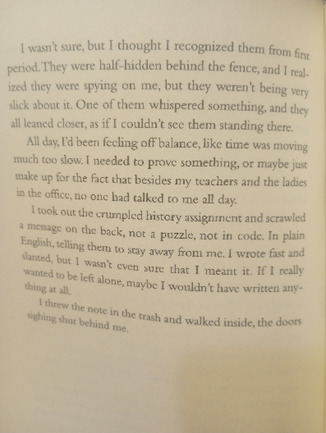
This leads me to another inspiration for Max’s character that the Duffer Brothers sneak a reference to in the supply closet that Joyce and Bob make-out in: Annie, the musical based on the comic strip Little Orphan Annie.
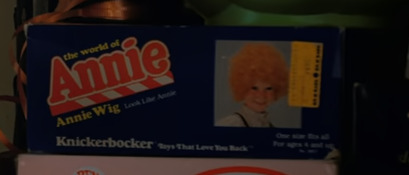
I’ll be honest in admitting that the most I know about the musical comes from the 1982 film adaptation, and it’s not one I cared for. In general, I’m not a fan of musicals (Phantom of the Opera and Les Misérables are the only two Broadway Musicals I’ve ever been invested in), and Annie isn’t something I grew up with, so I don’t have much emotional attachment to it. I see the parallels between Annie and Max in that both are feisty redheads who come from abusive backgrounds (Annie dealing with abuse from Ms. Hannigan, and Max from Billy and Neil), both put on a tough exterior (and make it clear they’re not afraid to fight boys) but they also have a sensitive and caring side underneath. And both eventually manage to escape their abusive circumstances. The difference is while Annie gets her happily ever after, Max’s fate following season 4 remains to be seen.
Fun additional fact: Sadie Sink starred in the 2012 Second Broadway Revival of Annie:
youtube
Next we’ve got Bob! Dear old Samwise Gamgee Bob Newby!
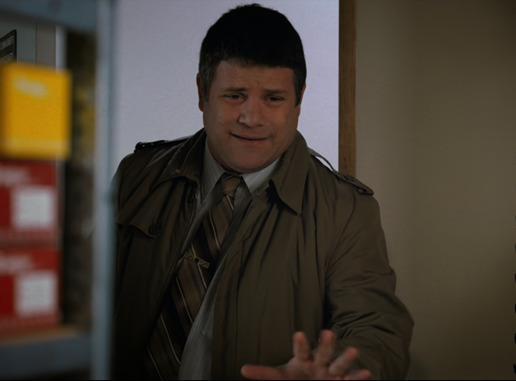
Even back when I first saw season 2, I always liked Bob and Joyce’s relationship, however brief it was. He was everything Lonnie Byers failed to be: Kind, empathetic, intelligent, genuinely in love with Joyce, trying to relate to Jonathan and Will, and being one of the few people to make Joyce genuinely happy.
Seriously, this is the happiest I’ve seen Joyce in a long time. Blushing like a school-girl:

I was interested in Bob’s claim in this episode that Joyce didn’t know who he was in high school, given the events depicted in The First Shadow. To my recollection, the show doesn’t state what Bob’s age was, but considering Joyce was well on her way to graduating by 1959, and Bob’s partnership with Joyce and Hopper on the case over the pet killings in Hawkins was only for a brief period of time, I think there’s leeway regarding how Bob’s comment can be interpreted. Joyce may have indeed overlooked Bob for most of her time in high school up till that point. In any case, there is context for why it was easier for Joyce to start a relationship with Bob later on, as opposed to her dating any other random dude following the shitshow that was her marriage with Lonnie.
I was happy they cast Sean Astin for Bob, not just because of his role in The Goonies (another movie I intend to talk about down the line), but also because The Lord of the Rings is one of my favorite trilogies, and his portrayal as Sam will always be iconic for me. Given how recognizable he is as an actor, I expected Bob at the time to survive to the end of the season, but I guess that was a false hope. Regardless, Bob did leave his mark on the show (specifically on Joyce’s character), and there are ramifications regarding his role that I plan to talk about in later reviews.
Finally…………there’s Billy. I don’t really have a lot to say about him in this episode, other than I found the scene with Carol and the other girls oogling at him to be eye-roll inducing. 🙄 For as much as Carol spent last season slut-shaming Nancy, I would not be shocked if she cheated on Tommy with Billy, and then Billy proceeded to dump her ass in the most humiliating manner possible (something Max alludes that Billy has done multiple times with other girls in Runaway Max). If the phrase “Every accusation is a confession” ever applied to a character on this show, Carol would be a top qualifier.
Part 3: Foreshadowing and References

Palace Arcade ranks as one of my favorite locations from the show. I have huge nostalgia for arcades from my childhood, namely because me and my teammates from soccer, baseball, and basketball games in both Elementary and Middle School would visit them after a final game. While I never got to play Dragon’s Lair or Dig Dug (since they didn’t have those games at our location), I did play Pac-Man, as well as Mortal Kombat, pinball, hunting games, shooter games (one of which was based off Terminator Salvation), and California Speed. Sadly, I only had a limited amount of quarters I was given for these games, so I had to make every moment count if I was aiming for a high score.
Palace Arcade was named in honor of the 20 Grand Palace Arcade from the 1983 movie WarGames (which is also one of the three films Jonathan picks up for movie night in this episode). Because the film’s plot holds parallels to season 4’s road trip arc with Mike, Will, Jonathan, and Argyle, as well as Suzie’s part in that, I will wait to discuss the movie in-depth when I cover those episodes. For this season though, Jonathan and Nancy’s arc in seeking out Murray to help bring down Hawkins Lab slightly mirrors WarGames when the characters of David Lightman (Matthew Broderick) and Jennifer Mack (Ally Sheedy) seek out Dr. Stephen Falken in the hopes he can stop his creation (The War Operation Plan Response) from causing Nuclear Armageddon. The behind-the-scenes companion book Worlds Turned Upside Down offers more insight into the Laundromat they converted into the Arcade:
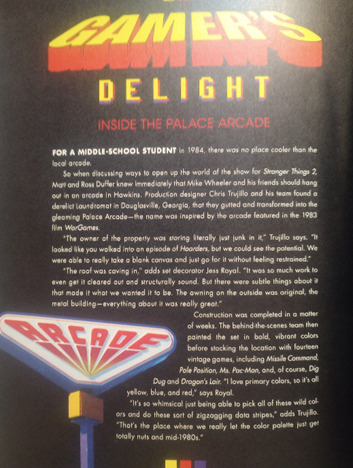
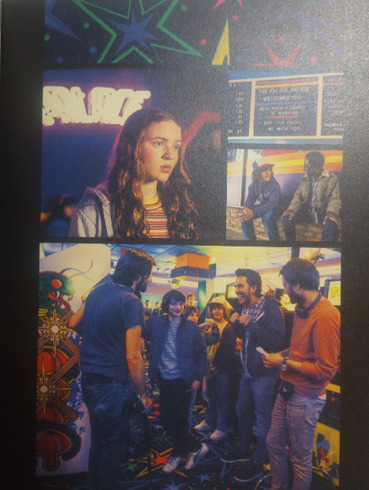
In any case, I was sad when the location disappeared after season 2. I get the characters were growing up and wouldn’t hang around there forever, but I still miss the brief nostalgic joy it brought me.
Two specific games get referenced in this episode which contain foreshadowing for events later in the season: Dragon’s Lair and Dig Dug.
The former arcade game was animated by Don Bluth (director of The Secrets of NIMH, The Land Before Time, and Anastasia to name a few of his movies) and was an “on rails” quick time event game where players controlled the reflexes of the main character (Dirk the Daring) as he entered a magic castle filled with monsters and other perils in his attempt to rescue Princess Daphne from a dragon name Singe. The game was notoriously difficult, but also extremely popular when it came out in 1983. The first video gives a little more information about Dragon Lair's history for those who are interested, and the latter video is the entire gameplay:
youtube
youtube
It’s been confirmed in Beyond Stranger Things that the scene with Dustin playing Dragon’s Lair and losing, along with Lucas’s comment about how Princess Daphne was still his (indicating Lucas had beaten Dustin at the game before), was thematically tied to the Dustin/Max/Lucas love triangle this season, as well as foreshadowing for how Lucas would be the one who ultimately ends up with Max.
Likewise, Dig Dug was another popular arcade game dealing with players digging tunnels underground while eliminating enemies in the area (usually Pookas or Fygars) either by hitting them with an air-pump or using rocks in the environment to crush them.
youtube
Paul Dichter, writer for the show, admitted that the game was tied thematically to the reveal of the Upside Down tunnels underneath Hawkins, with its vines, poisonous spores, and demodogs. The game itself also acts as foreshadowing for the climax of the finale when Steve, Mike, Lucas, Max, and Dustin all venture into the tunnels to burn them as a distraction to direct the Mind Flayer’s attention away from Hopper and El.
Another shout-out in this episode goes to Ferris Bueller’s Day Off (another Matthew Broderick movie) in the scene when Mr. Clarke is teaching about the human brain, and most of the students (with the exception of Mike, Will, Dustin, and Lucas) look bored or disinterested. To be honest, I felt like this homage was a little unfair to Mr. Clarke, especially in comparison to Ben Stein’s character from the movie and his teaching methods. Say what you will about Mr. Clarke, but he is passionate about science and clearly wants these kids to be excited about it, whereas Ben Stein’s character couldn’t give less of a crap about student interest, which is why his lecture is as fun as watching paint dry:
youtube
I will say this for the Ben Stein scene: The subject matter regarding tariffs during the Great Depression and how that failed spectacularly in alleviating economic woes feels uncomfortably relevant considering what Trump and his cronies are currently doing by starting a trade war with tariffs that's crashing the U.S. economy and pissing off our allies abroad. 😒
Speaking of politics, since this season takes place in 1984 a week before the Election (which was held on November 6th, 1984, the day after El closes the Gate) we get to see a bunch of Election paraphernalia, from the Reagan/Bush ’84 sign outside the Wheeler house, to the “Vote Here” sign at the Middle School:

We’ll later see a Mondale/Ferraro sign outside Dustin’s house. Runaway Max also confirms Neil Hargrove was a Reagan supporter.
If I had reviewed season 2 last year, or even before that, I would have likely found references to the 1984 election to be a cool shout-out to historical events. Considering we just got done with an election where over half of America voted for a convicted felon and misogynistic rapist, whose administration over the past 2 months has been a fucking clown show of corruption, cruelty, and stupidity on a grandiose scale, I find the references to be a depressing reminder of what recently happened. I will eventually move past my bitterness (those there are certain individuals I will hold a grudge against for a long time), but damn it didn’t have to be this way.
We've already mentioned WarGames, but the other two movies Jonathan brings home for his family to watch are Twilight Zone: The Movie and Mr. Mom. The former consists of four anthology stories directed by John Landis, Steven Spielberg, Joe Dante, and George Miller based on the popular show The Twilight Zone. The latter is a 1983 comedy starring Michael Keaton where his character loses his job and becomes a stay-at-home dad while his wife turns into the breadwinner for the family and looks to advance her career. Mr. Mom works as foreshadowing for the direction Steve’s character will go later in the season when he becomes the babysitter for the Party and takes on more responsibilities that allow him to mature. As for Twilight Zone: The Movie, I don’t see a lot of parallels between that movie and this season, aside from maybe suggesting the gremlin destroying the plane in “Nightmare at 20,000 Feet” is comparable to the destruction the demodogs will unleash on Hawkins Lab, or even how Anthony’s character from “It’s a Good Life” mirrors a young Henry Creel in that they both have powers and an unstable mindset that makes them dangerous to everyone around them. Difference is that while Anthony found someone who could act as a mentor for him, with his story ending happily, the same cannot be said for Henry. To be honest, I’m somewhat surprised this movie was even referenced at all since anyone who knows about the troubled production surrounding Twilight Zone: The Movie (specifically the on-set deaths of Vic Morrow and the two child actors who were hired illegally) is aware the movie is an Old Shame for most people who worked on it. There were years worth of lawsuits and court cases over what happened, Spielberg ended his friendship with John Landis in the aftermath, and it cause permanent changes in the film industry regarding safety procedures and how much control directors had on set.
Speaking of Spielberg, one movie of his that’s been cited as inspiration for season 1, and is paid homage to in this episode, is Close Encounters of the Third Kind. Specifically, the vision of the Mind Flayer outside Will’s house mirroring Barry’s encounter with the aliens:
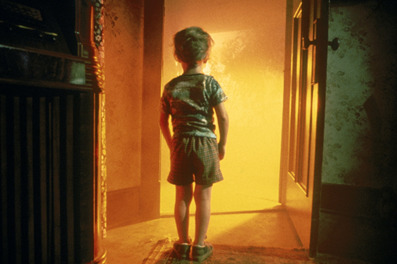
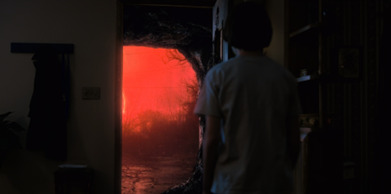
Unfortunately for Will, the Mind Flayer doesn’t have the same benevolent intentions of the aliens from that movie.
The Terminator gets a shout-out in this episode when we see it advertised at the Hawkins Theater. Some of the story beats will come into play in season 3 (specifically Hooper, Joyce, and Alexei being hunted by Grigori and the Russians) but the way the film was shot in Los Angeles, with its gritty urban aesthetic and filthy streets, will be seen later in Chicago when El travels there to meet Kali. Even the beginning of the episode when Kali’s gang is being chased by the police reminds me of when Kyle Reese and Sarah Conner are being chased by the Terminator:
youtube
youtube
Heck, even the opening credits for Stranger Things have a similar style to the opening credits from The Terminator:
youtube
youtube
Part 4: Miscellaneous Stuff (Will, Hopper, and the Upside Down)
I’ve come to expect that each season of Stranger Things will feature bullying as a theme of some kind or another, but even with the nasty note Will found in his locker, I find the whole insult behind “Zombie Boy” to be incredibly stupid, and Max's narration from Runaway Max best sums up why:
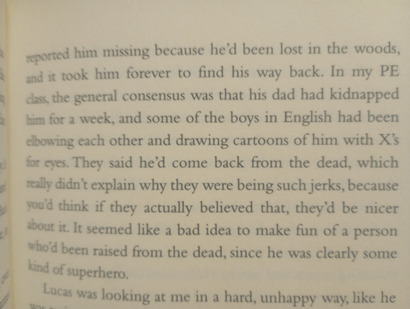
Like I said in my review of “The Body,” I don’t think this is entirely reflective of the entire student population at Hawkins Middle School (unlike the Rink-O-Mania crowd from season 4) since we did see kids like Jennifer Hayes who were upset when they thought Will died, or were otherwise somber about it during the assembly, but it’s always the assholes that make everyone else look bad.
It’s noteworthy the newspaper article from Will’s locker is different from the article at the Police Station in the season 1 finale:
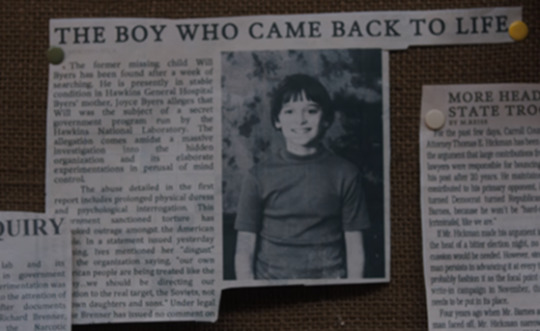
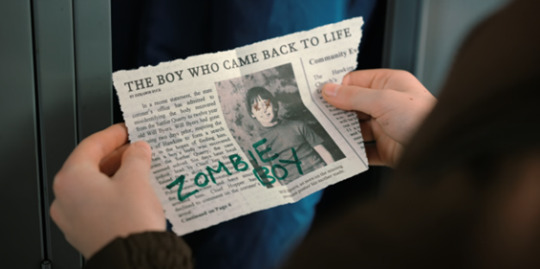
There’s a major discrepancy between the two articles, and I question if that was done on accident or on purpose by the writers. Season 1 established there were a lot of rumors going around regarding what happened to Will. Considering how quickly gossip tinged with misinformation seems to spread around Hawkins, I wouldn’t be surprised if conspiracy theorists in the area started spewing their own garbage takes, one thing led to another, and that’s how the first article alleging that Joyce claimed Will was subjected to “a secret government program” by Hawkins Lab got published. Bearing in mind that Hopper emphasized to Joyce in “The Upside Down” that the conditions for getting her son back involved not holding Hawkins Lab responsible (“You want Will back? This place had nothing to do with it. That’s the deal. You got it?”), I seriously doubt Joyce would have been stupid enough to shoot her mouth off like that to a newspaper. That’s also including how the last shot of Hopper, prior to the December time-jump, was him getting into a car with federal agents, with the implication being these agents laid out the terms for the cover story and what was expected from Hopper and everyone else who’d been involved with what happened.
In any case, I think the “Zombie Boy” news article is the correct article, and has a cover story that makes sense: They threw the State Coroner, who’d been hired by Hawkins Lab in season 1 to claim the fake body they planted at Sattler’s Quarry was Will’s body, under the bus.
Will’s drawing of “Zombie Boy” and using art as an expression for his trauma reminds me of the graphic novel Zombie Boys, which takes place prior to the events of this season, where the boys meet an aspiring filmmaker in their grade named Joey Kim, who writes and directs a zombie movie based on Will’s drawings, with the movie helping the boys to work through some of the pent-up emotions they’ve had since the events of season 1:

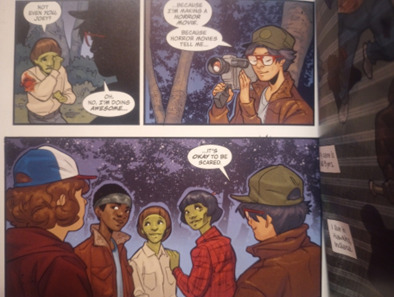
If you haven’t read the graphic novel, I highly recommend it. It’s got a great story, and it ties in well with the themes regarding trauma and finding ways to cope with it.
I will discuss the pairing of Hopper and El in later reviews, but in regards to Hopper’s investigation into the rotting pumpkin patch, they mention in this episode that it just started (with the pumpkins being fine the day before), and we later discover that the tunnels underground created by the Upside Down factored into this. My question is why did the rot only start now? Did the tunnels only just reach Merrill’s Pumpkin Patch on that particular day? I could be wrong, but I was under the assumption the creation of the tunnels from the Gate had been a year long process, and that part of the reason the Mind Flayer initially tolerated the burns Dr. Owens team inflicted on the tendrils and biological matter near the Gate was because it was trying to keep the network of tunnels a secret at the time. However, if the tunnels had been spreading throughout Hawkins for the past year, there should have been other areas infected and dying before it ever got to Merrill and Eugene’s pumpkin patches. Assuming Hopper didn’t get any other reports regarding areas where Hawkins plant life was rotting away (which I guess makes sense since you wouldn’t normally call the police regarding something like that), it makes me wonder if other people noticed. Since Merrill and Eugene run a business selling pumpkins and the rot was affecting their income, it makes sense they would take notice. Everyone else may have treated this as an abnormal curiosity, but not something to panic over yet.
There was a brief continuity error I noticed at the beginning of this episode: It’s stated with screen titles that Kali’s raid in Pittsburgh, Pennsylvania takes place on October 28th, 1984. However, the evening news report which covers the police chase on Dustin’s TV indicates this happened the same night Dustin and his friends went to Palace Arcade. Considering the next day takes place on October 30th, 1984 (as confirmed when Bob videotapes Joyce making popcorn, as well as Merrill mentioning to Hopper that it’s the day before Halloween), this means that the initial date this episode starts with should have been on the evening on October 29th, 1984. Not the worst continuity error in the world (Birthdaygate in season 4 would surpass that), but it is a notable screw-up.
Part 5: Song Choices:
One of the first 80s songs we hear play is “Whip It” by Devo.
youtube
Contrary to how the music video makes the song seem sexually suggestive (like some kind of BDSM fetish), Devo has admitted the song’s nonsensical lyrics were meant as a satire of the “can-do” motivational attitude used in American capitalist culture to make it seem like people can push through anything with the right mindset (“When a problem comes along, You must whip it.”). A reviewer named Steve Huey put it best when he noted that the song is “a sardonic portrait of a general, problematic aspect of the American psyche: the predilection for using force and violence to solve problems, vent frustration, and prove oneself to others.” Even Jerry Casale, the co-founder and vocalist for the band, admitted the lyrics were supposed to sound like cliché inspirational slogans taken out-of-context (“Go Forward! Move Ahead! Try not to detect it! It’s not too late!”). Considering this song is playing when the boys are arriving at Palace Arcade while psyching themselves to get top scores and show everyone they’re the best at these games, this song was an appropriate choice.
Next song is Oingo Boingo’s “Just Another Day,” which plays the next morning after the Arcade scenes, showing daily life in Hawkins and Hopper driving to work with Murray there to meet him. Despite that brief snippet of the song in the scene suggesting “It’s just another day” like any other, the lyrics are ominous and disturbing, to the point you begin to question the singer’s mental health. (“I do not trust my ears. I don’t believe my eyes!”). There’s a sense of unease that something bad is going to happen, like a premonition (“I had a dream last night. The World was set on fire. And everywhere I ran. There wasn’t any water!”) (“And just when I think, that things are in their place, the heavens are secure, the whole thing explodes in my face!”). Given the Mind Flayer has set its sights on Will, and spent a year preparing for an underground invasion of Hawkins, the lyrics act as foreshadowing for what’s to come, and they even apply to later seasons now that Vecna’s opened a bigger Gate and plans to burn the world.
The next song plays when Nancy and Steve go over Steve’s college application essay: “Talking in your Sleep” by The Romantics. The song depicts a couple where one of the lovers hears the other sleep-talking at night when they’re at their most vulnerable, with the sleep-talker expressing that they love the other person and need them in their lives. In the context of Nancy and Steve, the song comes across as bitterly ironic since Nancy has long fallen out-of-love with Steve at this point and her heart belongs to Jonathan. It makes me wonder if the sleep-talker in the song is meant to represent Steve since he hasn’t fallen out of love with Nancy yet.
The next song comes during Billy and Max’s introductions: “Rock You Like A Hurricane” by Scorpion. Rudolf Schenker, songwriter and guitarist for the band, mentioned in an interview that the song was supposed to be a rock anthem about attitude and sexuality. It’s certainly reflected in the song’s lyrics: (“The Bitch is hungry. She needs to tell. So give her inches, and feed her well.”) (“Lust is in cages, Till storm breaks loose, Just have to make it, With someone I choose”). The way the singer acts in this song conveys this idea that he’s less of a human and more of an animal, or even a force of nature (“He’s licking his lips. He’s ready to win. On the Hunt tonight, for love at first sting. Here I am! Rock you like a Hurricane!”). I guess that’s a pretty accurate description for Billy’s character, but it’s not one that makes him appealing, and comes with so many negative connotations. Hurricanes come and destroy everything in their path while you’re left picking up the pieces afterwards, and the animalistic descriptions convey the idea this person is only looking for instant gratification (to say nothing about the misogynistic attitude Billy has towards women in general).
A similar themed song is “Every Other Girl” by Prehistoric Wolves, which is heard over the headphones of the tech guy who’s bouncing the ball right as the alarms for the Lab go off. I wasn’t able to find a lot of information about this song or the band other than this, but the lyrics convey the idea that the singer goes through multiple affairs, with each conquest being treated as “every other girl, every other night.” Charming. 😒 There are plenty of other songs that have a similar sleazy quality where the singer is either cheating on someone, or else philandering (“Your Love” by The Outfield comes to mind), with the general theme of callousness and instant gratification. I can’t speak for what’s going on with that Lab Technician (or if this was just a distraction song to pass the time), but I definitely can see how it would apply to Billy and his approach to relationships with girls.
Finally, there's “Spooky Movies” by Gary Paxton, which plays when Bob comes to Joyce’s work to make out with her. It’s a fun Halloween song talking about how a guy’s lover prefers spooky movies over a date with him, and makes reference to famous horror monsters (King Kong, Dracula, Frankenstein, etc). The joke is that the monsters measure up for this girl better than her boyfriend (though it’s implied it’s just playful teasing and not meant to be taken seriously). This is coming on the heels of Bob asking Joyce not to have Jonathan bring home any scary movies to watch (though Jonathan brings home Twilight Zone: The Movie anyways) and then picking Mr. Mom, which is the furthest from a Halloween movie as you can get. Either way, the song does a great job establishing Bob as a fun-loving guy to be around.
Overall, this was an enjoyable episode.
#stranger things#stranger things madmax#tgh opinions#tgh reviews#mike wheeler#will byers#byler#dustin henderson#lucas sinclair#max mayfield#nancy wheeler#steve harrington#jonathan byers#jim hopper#joyce byers#el hopper#bob newby#kali prasad#sam owens#murray bauman#barbara holland#scott clarke#the mind flayer#carol perkins#anti billy hargrove#stranger things season 2#the duffer brothers#worlds turned upside down#beyond stranger things
30 notes
·
View notes
Text
“The Sniper Problem”
I have a favorite litmus test that I apply to just about everything I write: “Could this entire plotline be resolved by one sufficiently trained sniper?” The hypothetical sniper is there to evaluate the quality of the conflict I’ve set up. If they can resolve the whole thing by taking out their target then I… probably have some rethinking to do, because the test succinctly highlights a few key issues with any story that fails it.
First, the obvious: if the problem your protagonists are facing can be solved this way it’s probably just not as interesting as it could be. A conflict of “big bad evil dude does a big bad evil thing and our hero goes and mercs him about it” can make for a fun blockbuster action film, but the plot of those films are rarely–if ever–the point. Stories with a central villain stand to gain a lot of narrative depth from asking yourself what issues would linger if they were suddenly removed from the picture. What internal struggles might remain in your protagonists? How might the world around them still need to be changed or healed? Which elements or areas of the story just seem empty without the big bad to fill the narrative space, and how can we develop them?
The second facet of the sniper problem is an inverted Occam’s Razor, a call to ensure that there’s a good reason the protagonists aren’t just using a simple and direct route to solve their problems. It���s like how modern horror movies have to cripple the victims’ cell phones to justify everything else that happens, though ideally less contrived. When revising a story through this lens, it’s almost difficult not to improve it. It aids suspension of disbelief, lets your protagonists present as more competent, and gives them more to do outside of biffing people they don’t like which in turn showcases more of their personality.
A great example of all of this is Avatar: The Last Airbender. Throughout the show the bottom line is that our heroes are out to defeat the Firelord to stop the atrocities he’s committing against the rest of the world. So it stands to reason to ask, why not camp outside his house early on with an assassin good enough to score a quick or lucky kill? But the show answers this amply with just its concept, mostly without having to draw direct attention to it. If Firelord Ozai dropped dead in the pilot there would still be a whole Fire Nation pursuing his goals complete with other emotionally unstable royals and military officers. It wouldn’t actually… solve anything. “Defeat the Firelord” is just the mission that sets our heroes on the path they need to take to stop a war that’s destroying the world. The real solution is cultivating friendships across cultures, healing and maturing together, growing spiritually, protecting and empowering victims of generational violence, dismantling fascistic power structures, and ultimately even finding a relatively peaceful / humane solution to the problem of the Firelord. While they do call this out directly in one episode, they didn’t have to, because with the way they structured the narrative it was already evident. As a result of that good planning the characters got to do a lot of interesting, character driven, thematically resonant things and the show isn’t just one long and kind of dry martial arts training montage until they show up at the finale.
So keep the sniper problem in mind as you write! Or even as you read, watch, and analyze other media for what worked and what didn’t. I can’t promise it’ll be relevant to every story, but I can promise that it’s a quick and easy standard that’ll help you layer in a lot of nuance and flavor into your narrative.
64 notes
·
View notes
Text
I legitimately think that the first three borderlands (as in 1, 2, & TPS) are good dystopian satire, despite their questionable writing at times. A game/series that took itself more seriously could highlight this better, but Borderlands would lose a lot of its edge if it did.
Handsome Jack isn't just some charismatic villain that garnered a lot of affection from players by some fluke, but rather an excellent personification of the dystopian elements of Borderlands' background setting that make it engaging.
If you look at Borderlands 1, for all its effective lack of plot, the game is about these megacorporation's disregard for the human lives they ruin and their self-defeating obsession with attaining power and control (as seen with Commandant Steele's death). Borderlands 2 took that premise and swapped out the corporate antagonist, but it's not just a new coat of paint/roster of enemies: the motivations change while following similar themes as implied in BL1, now personified in Jack.
In BL1, the Atlas Corporation believes it owns Pandora, and everything (and everyone that primarily DAHL brought), on it is unrealized property they have free claim over. They believe the vault and its contents are owed to them, and it falls on the vault hunters showing up in the nick of time to remedy the potential resulting calamity.
Handsome Jack, meanwhile, has that similar belief that Pandora is "his," just that it's his to "save." He's Hyperion's current CEO because he is willing to do whatever it takes to get what he believes he is owed, one of which is respect as a hero of the people. The people he hates the most are those who deny or deprive him of those things: see his treatment of his daughter, after "what she did to her mother." His ego and disregard for the humanity of basically anyone else, treating them as a character in his story to be stepped on and/or discarded reflects an attitude of the megacorporations that makes the backgrounds of Borderlands so dystopian. I 100% believe that the system that makes a person like Handsome Jack could have produced nearly anyone in a similar mold.
Meanwhile, the Borderlands 1 vault hunters in 2 stand in stark contrast to not just Handsome Jack/Hyperion but also DAHL. Unlike Jack, they don't care about the aesthetics of heroism; they're just trying to protect as many people as they reasonably can from the horrors of Pandora. Unlike DAHL, they didn't abandon the planet and the survivors still there when the thing that brought them in the first place didn't pan out.
I think there's also something to the crude city of Sanctuary supporting plenty of residents versus the pristine city of Opportunity that's almost completely vacant of anything except instruments of war.
Of course, Jack's fall is thematically different from Atlas. Atlas gets defeated when it's claimed "property" slaughters the military sent to claim it; Jack gets defeated by watching his notions of heroism fall apart as the vault hunters cut down the calamity he summoned to "save" Pandora.
Then you get to Borderlands 3, which understood nothing but the aesthetic of the preceding series.
The only difference between the corporations you ally with and those you fight is the former have some friendly franchise blorbos (Rhys, Zer0, and Hammerlock). The corporations aren't fundamentally flawed factions that drive the terrible conditions of the setting for their lust for profit, they're just sometimes headed by someone evil and/or incompetent who maybe wants a merger (The "merger war" between Atlas and Maliwan is a good idea in theory, but it's ruined by going "this one is good" rather than focusing on helping those caught in the crossfire).
Meanwhile, the twins don't present a coherent threat as an element of Borderlands' underlying dystopia. They're just bad guys with lore things (derogatory) and their streamer gimmick. What I think is most insulting about them, though, is that they're just an excuse to use bandits everywhere with no though for an underlying point. The bandits of Pandora are the people DAHL left behind on that desolate rock of a planet, many of whom never wanted to be there in the first place. The twins could have shed some light on how receptive the bandits are to promises of salvation by whatever means because they have no hope otherwise.
I feel like a game that was trying to be more thematically coherent with previous entries would have flipped the villain script: the twins should have been misguided/tragic figures actively striving for a new, redeemed life for Pandora, while their corporate allies use them up and discard them.
39 notes
·
View notes